Special Report
Places at Greatest Risk of Hurricane Disaster
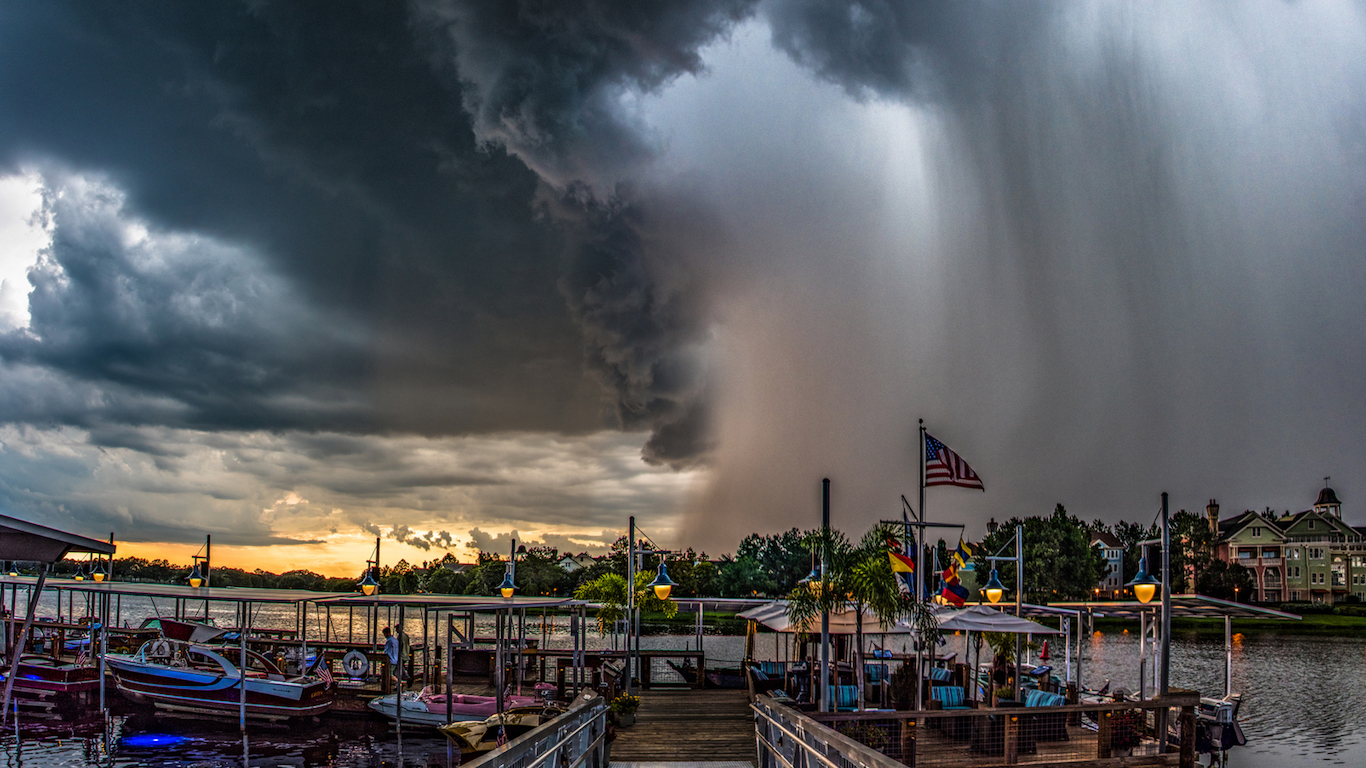
Published:
Last Updated:

After more than a decade of relative quiet, hurricanes Harvey, Irma, and Maria struck locations along the U.S. coast and Puerto Rico in 2017. Due largely to development along the shore during the unusually long hiatus, as well as the shear intensity of these storms, the devastation broke all records. The damage, likely underestimated, has been pegged at over $200 billion.
While hurricane prediction remains a remarkably inexact endeavor, rising global ocean temperatures and evidence that points to greater hurricane activity suggest destructive weather events are not going away. The highest level of North Atlantic hurricane activity on record was between 1995 to 2000.
The places at the greatest risk of a future disaster are most likely to be the places that have already experienced such weather events.
With this pattern in mind, 24/7 Wall St. reviewed the frequency of Atlantic basin hurricanes passing through an area between 1970 and 2016 in places across the continental United States and Puerto Rico. Using each area’s hurricane frequency we then calculated the average number of years between storms for every area. Those areas that have had at least one hurricane pass through them every two years on average make this list of places most likely to endure a major hurricane in the near future.
The size of these potential disasters is more closely related to the vulnerability of the areas than it is to the intensity of the storm.
Hurricane expert Michael Bell, associate professor of atmospheric science at Colorado State University, noted in an email to 24/7 Wall St., “[E]ven if hurricane intensity and frequency were to stay the same, changes in the exposure of life and property along coastal regions can increase the risk of injury and damage.” So while there is no significant trend since 1900 of hurricane frequency or intensity, hurricane-related damage has increased dramatically since the turn of the century.
A recent report by property information and analytics company Corelogic shows that close to 7 million homes along the Atlantic and Gulf Coasts are at risk of hurricane and storm surge damage.
Much of this damage is related to heavy rainfall and storm surge — abnormal rises in water levels caused by the force of storm winds — rather than the hurricane winds themselves.
According to a paper published in March by Geoffrey Heal, a professor of social enterprise at Columbia Business School, and Marco Tedesco, a research professor at Lamont-Doherty Earth Observatory, sea levels could rise by 15 feet by 2100. The next 50 years of sea level rise are widely considered by climate scientists to be inevitable.
Click here to see the places at greatest risk of hurricane disaster.
Methodology
To identify the places at the greatest risk of hurricane disaster, 24/7 Wall St. reviewed the frequency of hurricanes between 1970 and 2016 in cities, towns, villages, and Census Designated Places (CDPs) across the continental United States and Puerto Rico with populations of more than 10,000 people. We only considered storms in the Atlantic basin, which has one of the better historical hurricane records. We calculated the distance between the center of each geographical area and the center of storms at six-hour intervals after landfall. To be counted as part of an area’s hurricane record, the center of the storm needed to have passed within 50 miles of the center of the town during at least one of the six-hour intervals. Using each area’s hurricane frequency counted in this way, we then calculated the average number of years between storms.

50. Baytown, Texas
> Population: 75,310
> Recorded hurricanes since 1970: 21
> Last hurricane: Ike, 2008
[in-text-ad]
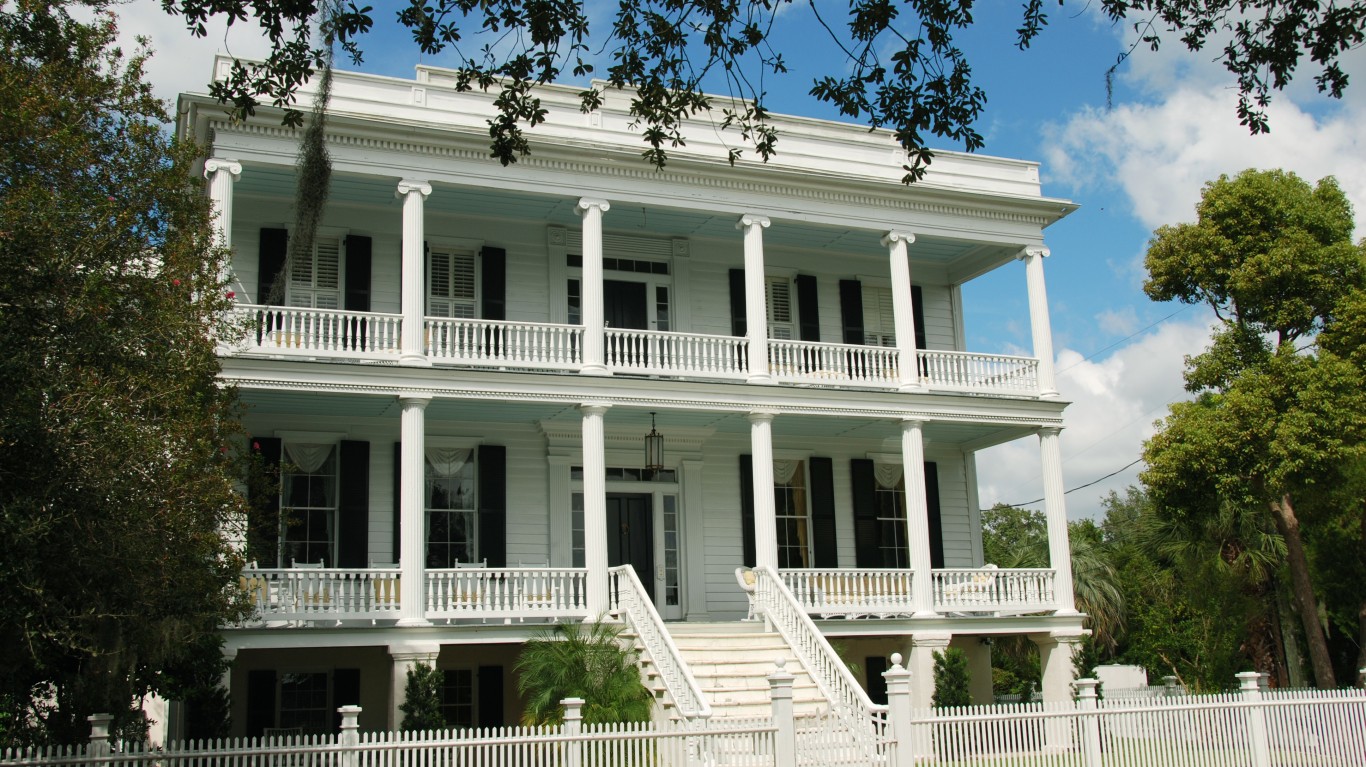
49. Beaufort, South Carolina
> Population: 13,074
> Recorded hurricanes since 1970: 21
> Last hurricane: Matthew, 2016
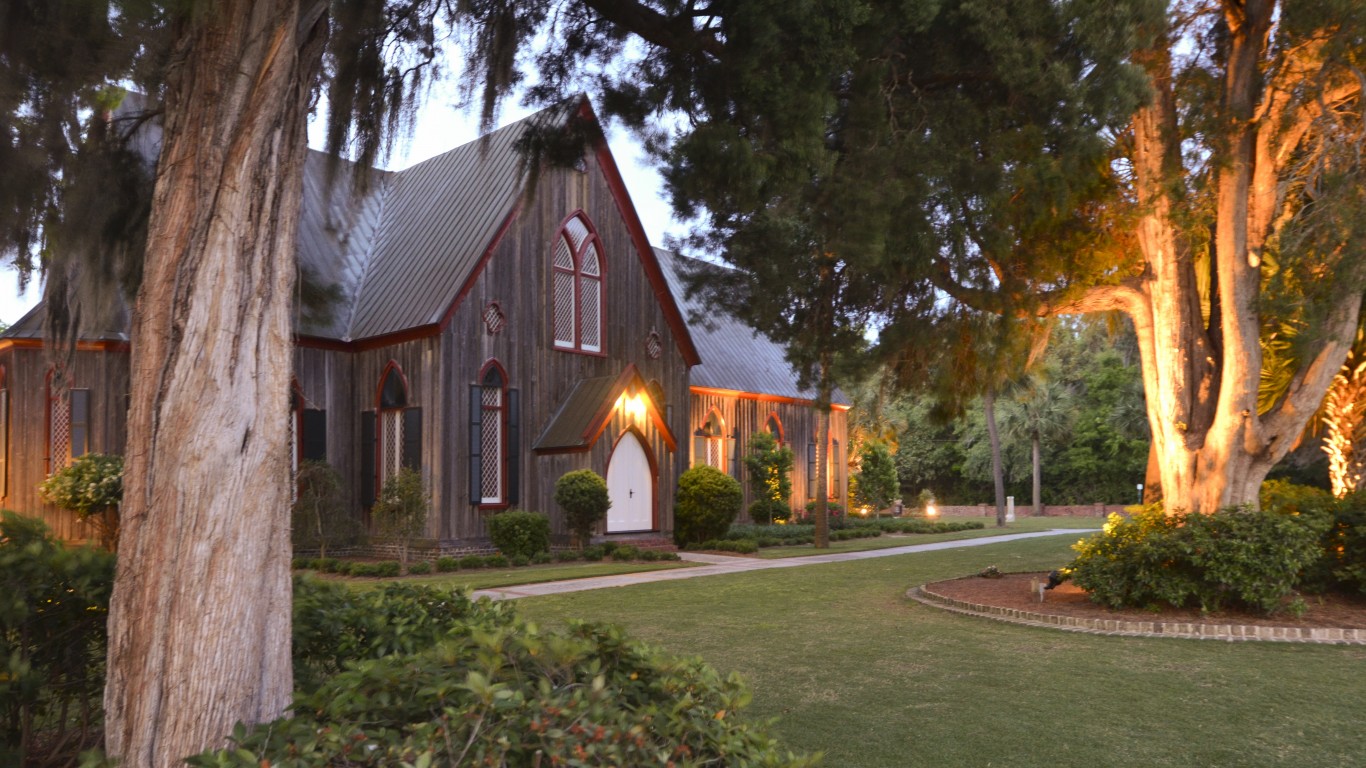
48. Bluffton, South Carolina
> Population: 15,765
> Recorded hurricanes since 1970: 21
> Last hurricane: Matthew, 2016
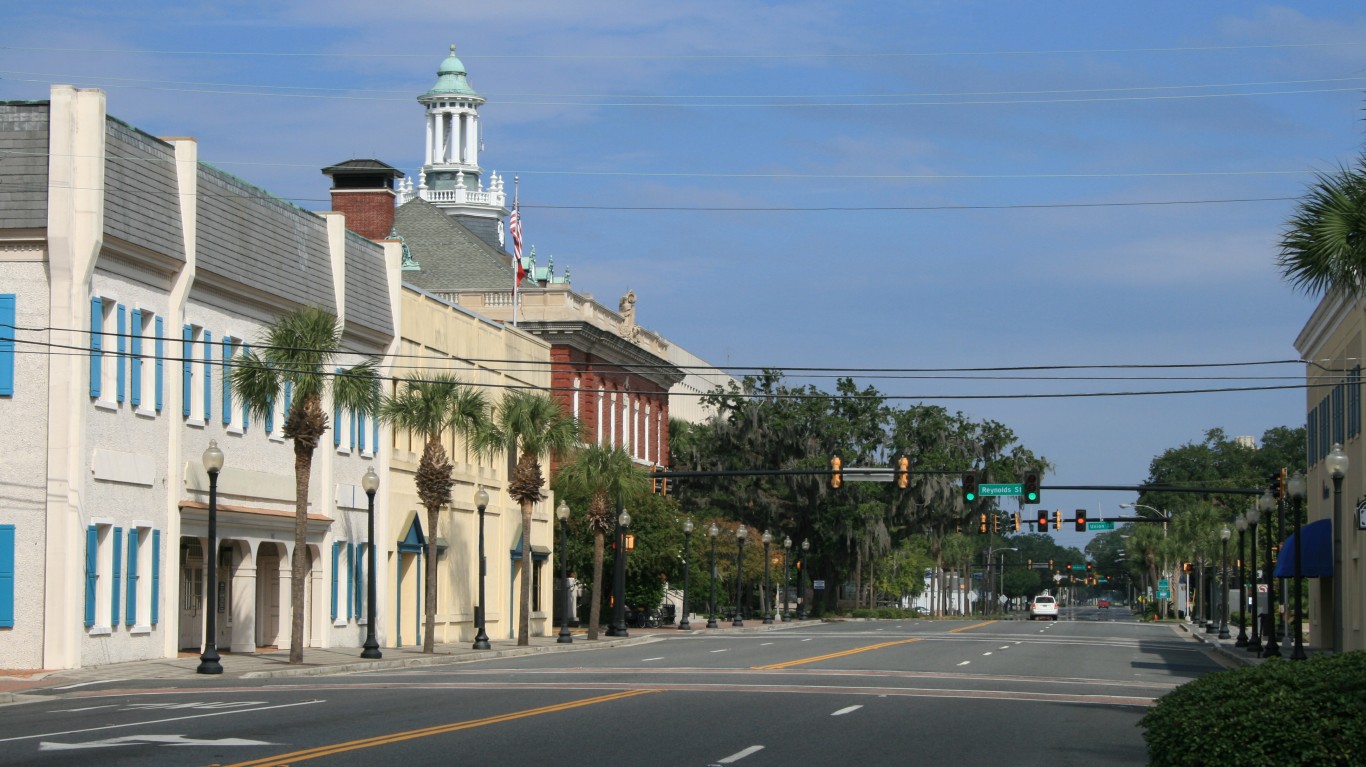
47. Brunswick, Georgia
> Population: 15,997
> Recorded hurricanes since 1970: 21
> Last hurricane: Julia, 2016
[in-text-ad-2]
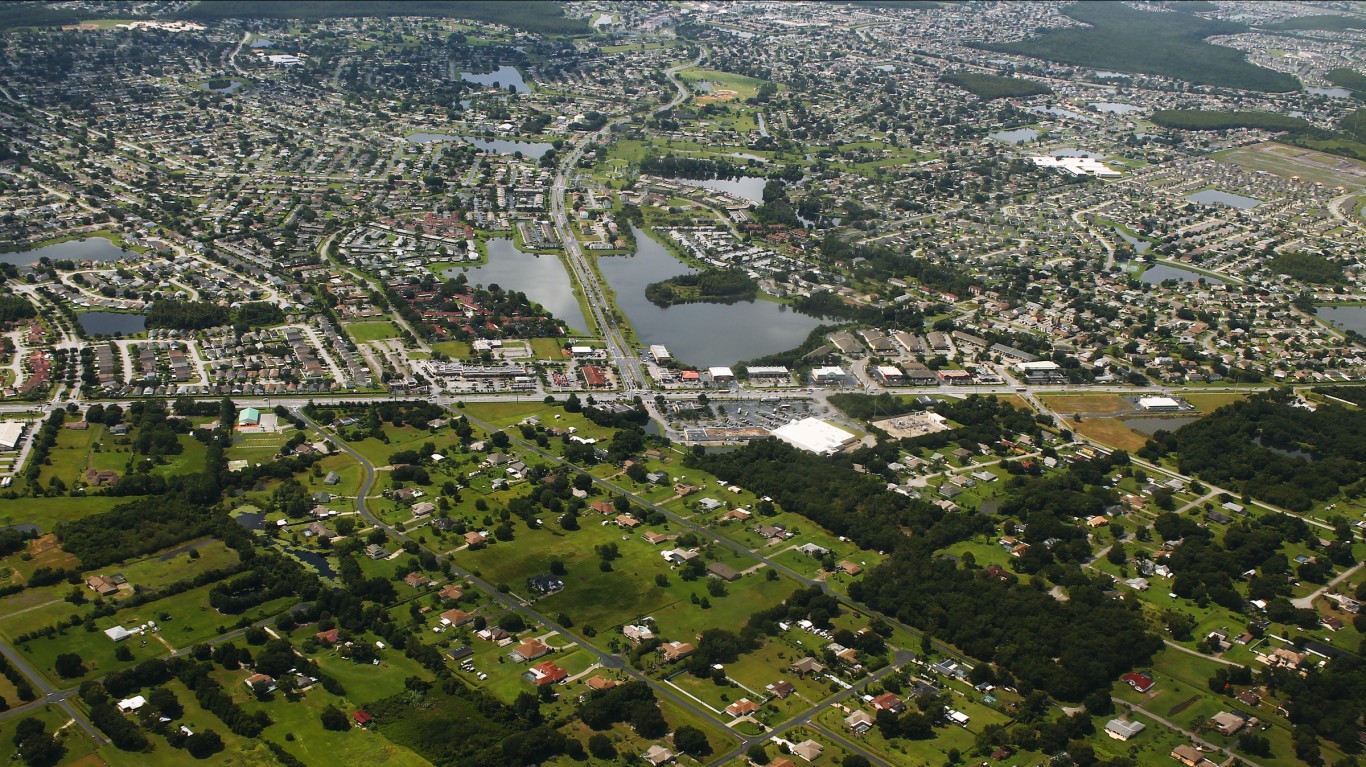
46. Buenaventura Lakes, Florida
> Population: 31,588
> Recorded hurricanes since 1970: 21
> Last hurricane: Julia, 2016
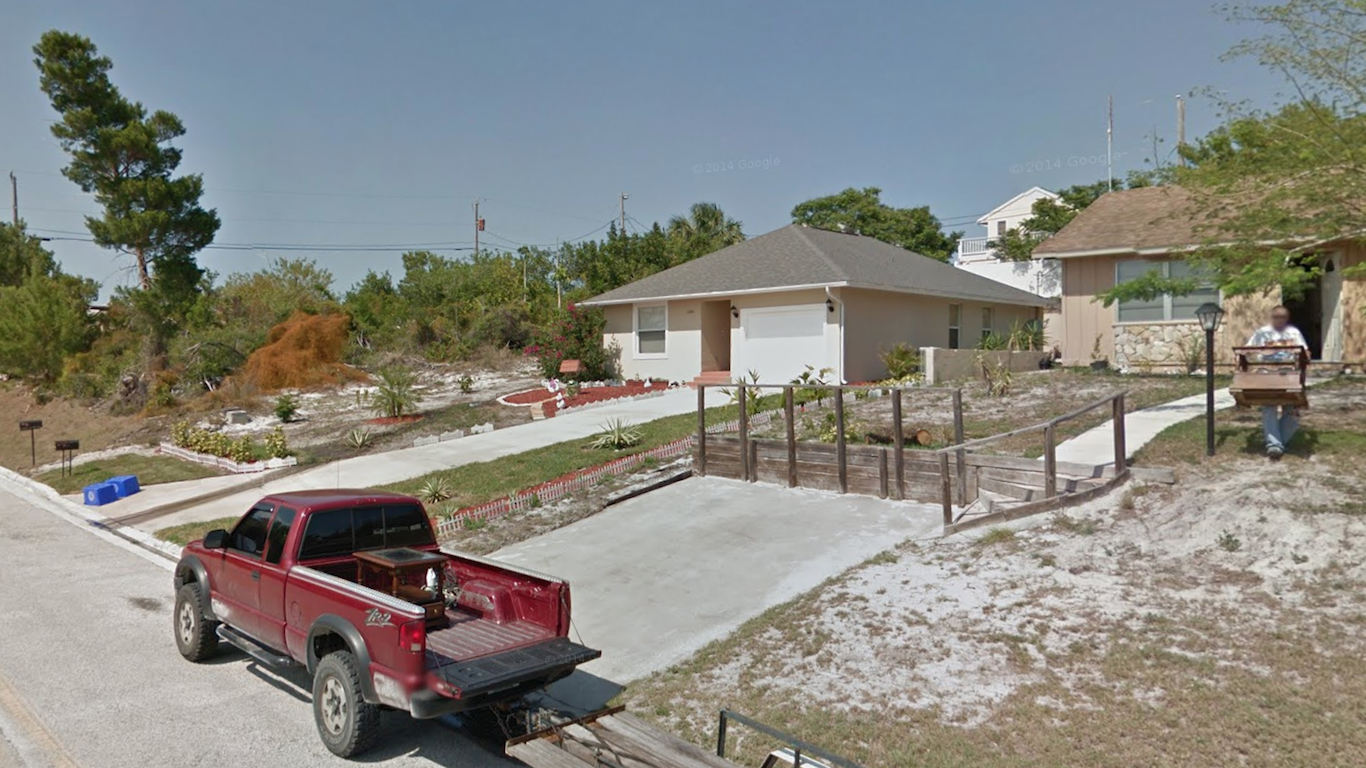
[in-text-ad]
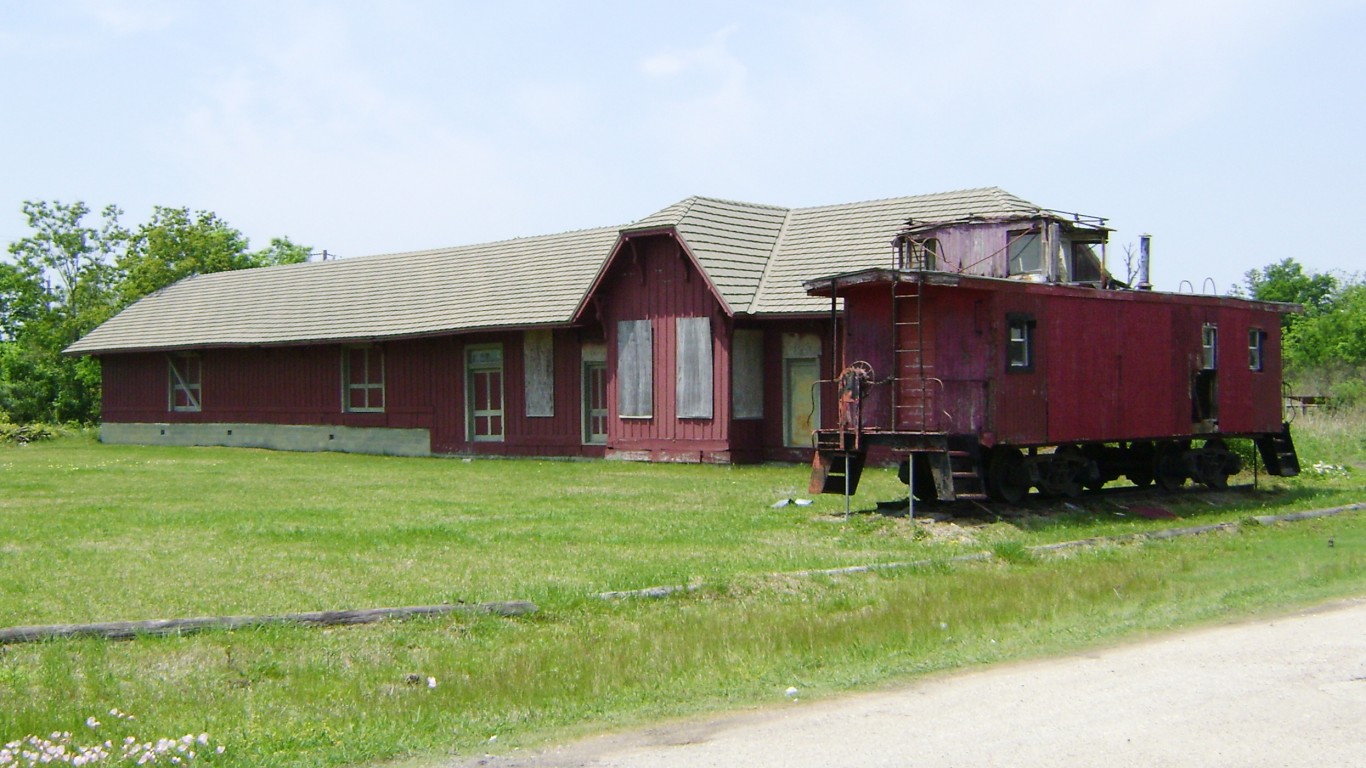
44. Friendswood, Texas
> Population: 38,272
> Recorded hurricanes since 1970: 21
> Last hurricane: Ike, 2008
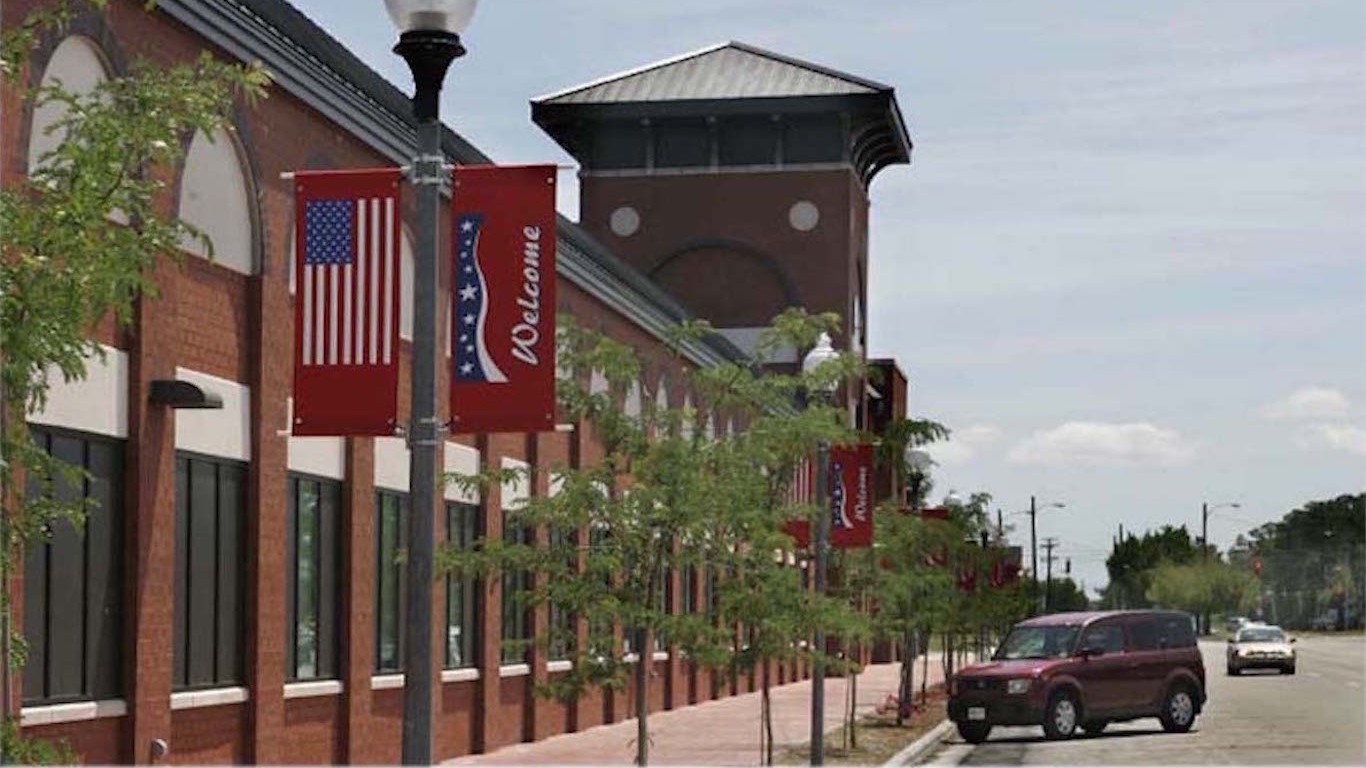
43. Jacksonville, North Carolina
> Population: 68,404
> Recorded hurricanes since 1970: 21
> Last hurricane: Julia, 2016
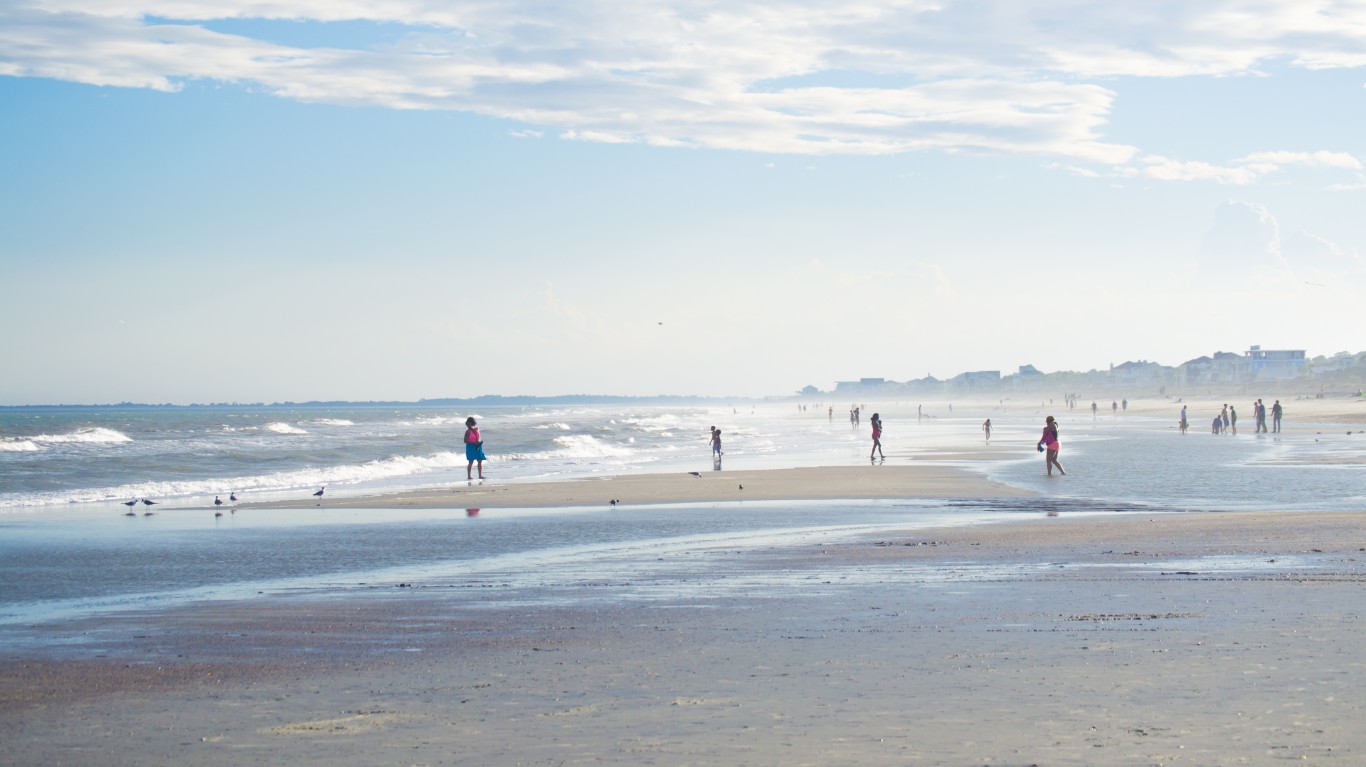
42. James Island, South Carolina
> Population: 11,844
> Recorded hurricanes since 1970: 21
> Last hurricane: Matthew, 2016
[in-text-ad-2]
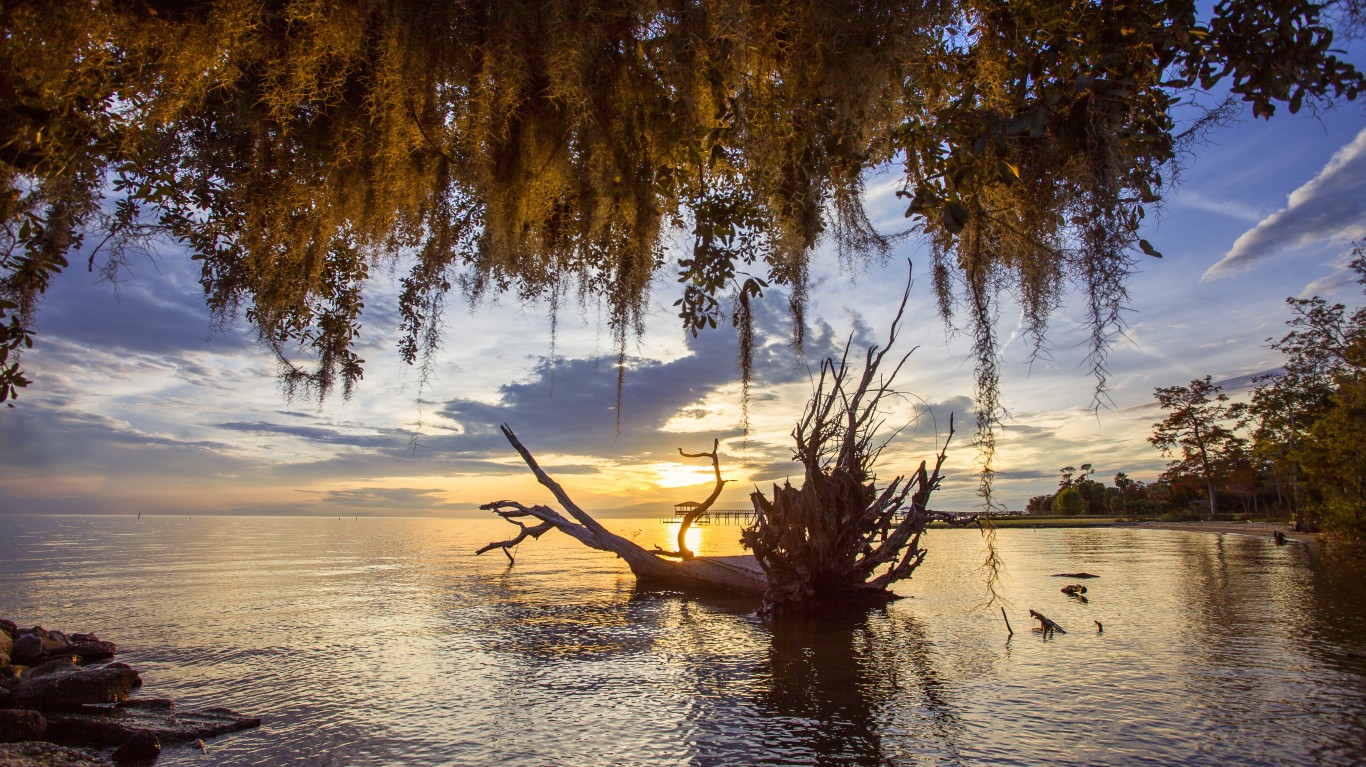
41. Mandeville, Louisiana
> Population: 12,244
> Recorded hurricanes since 1970: 21
> Last hurricane: Lee, 2011
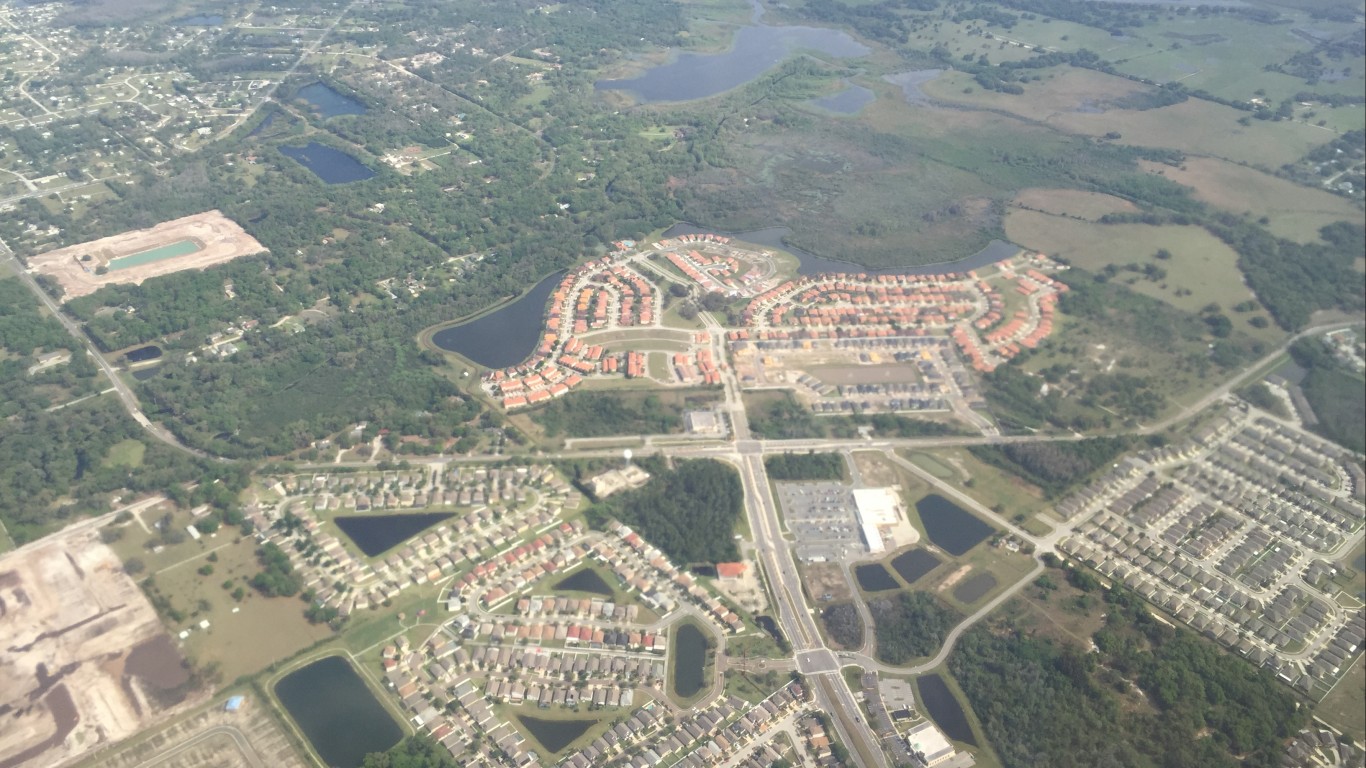
40. Meadow Woods, Florida
> Population: 31,077
> Recorded hurricanes since 1970: 21
> Last hurricane: Julia, 2016
[in-text-ad]
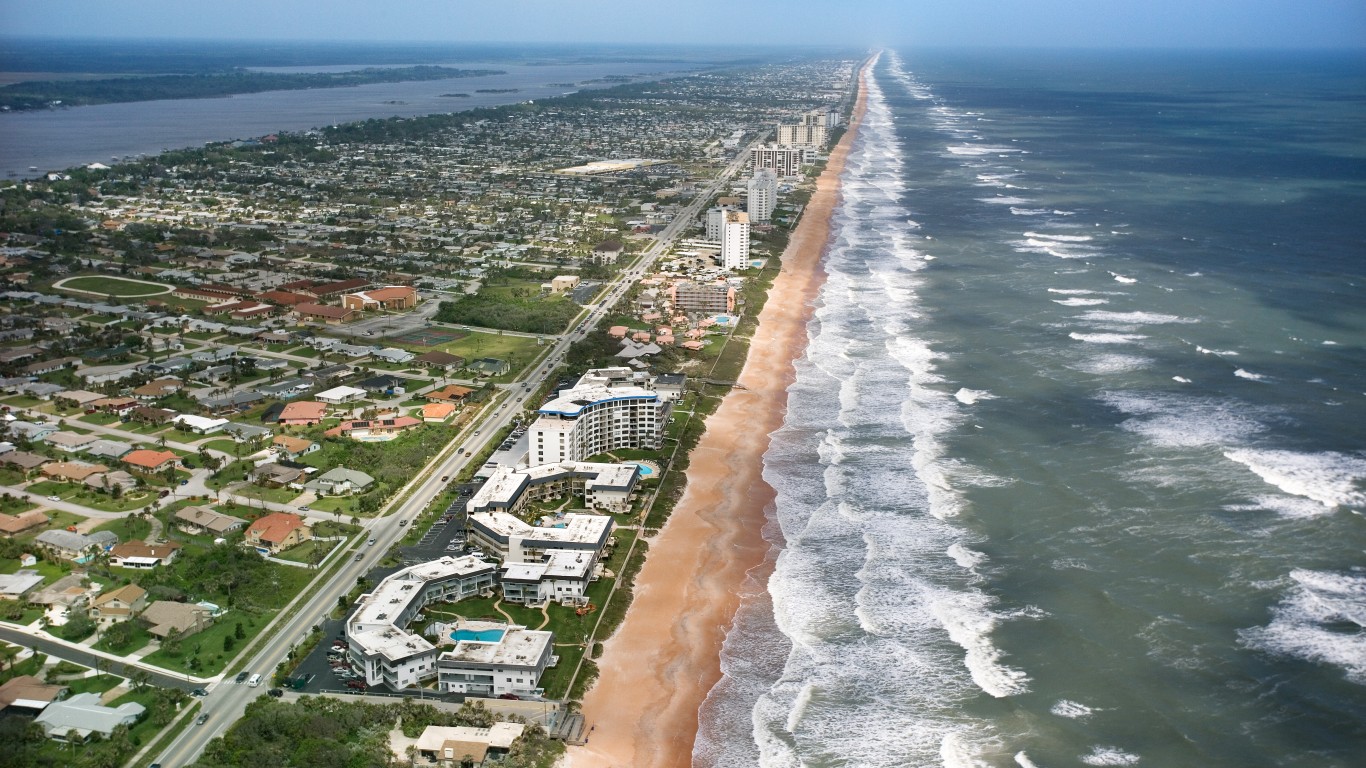
39. Ormond Beach, Florida
> Population: 40,686
> Recorded hurricanes since 1970: 21
> Last hurricane: Matthew, 2016
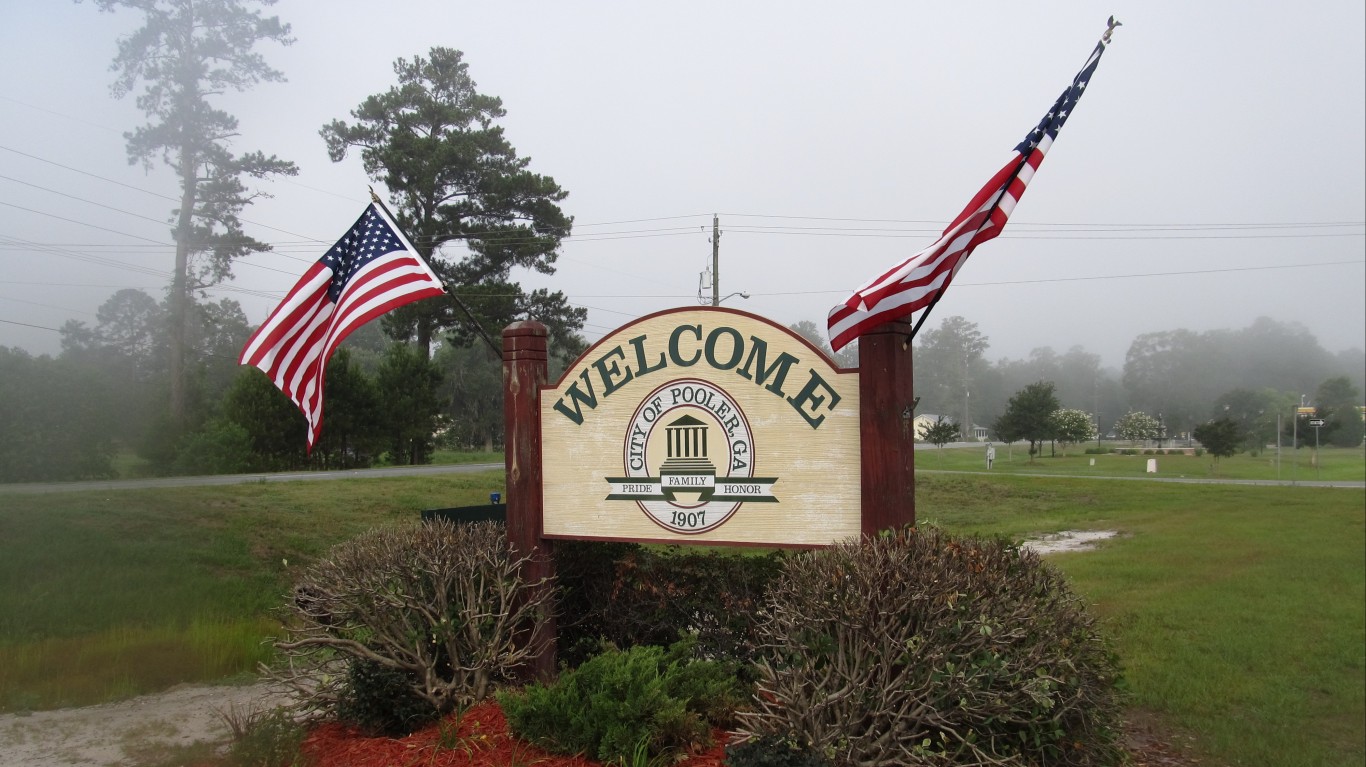
38. Pooler, Georgia
> Population: 22,131
> Recorded hurricanes since 1970: 21
> Last hurricane: Matthew, 2016
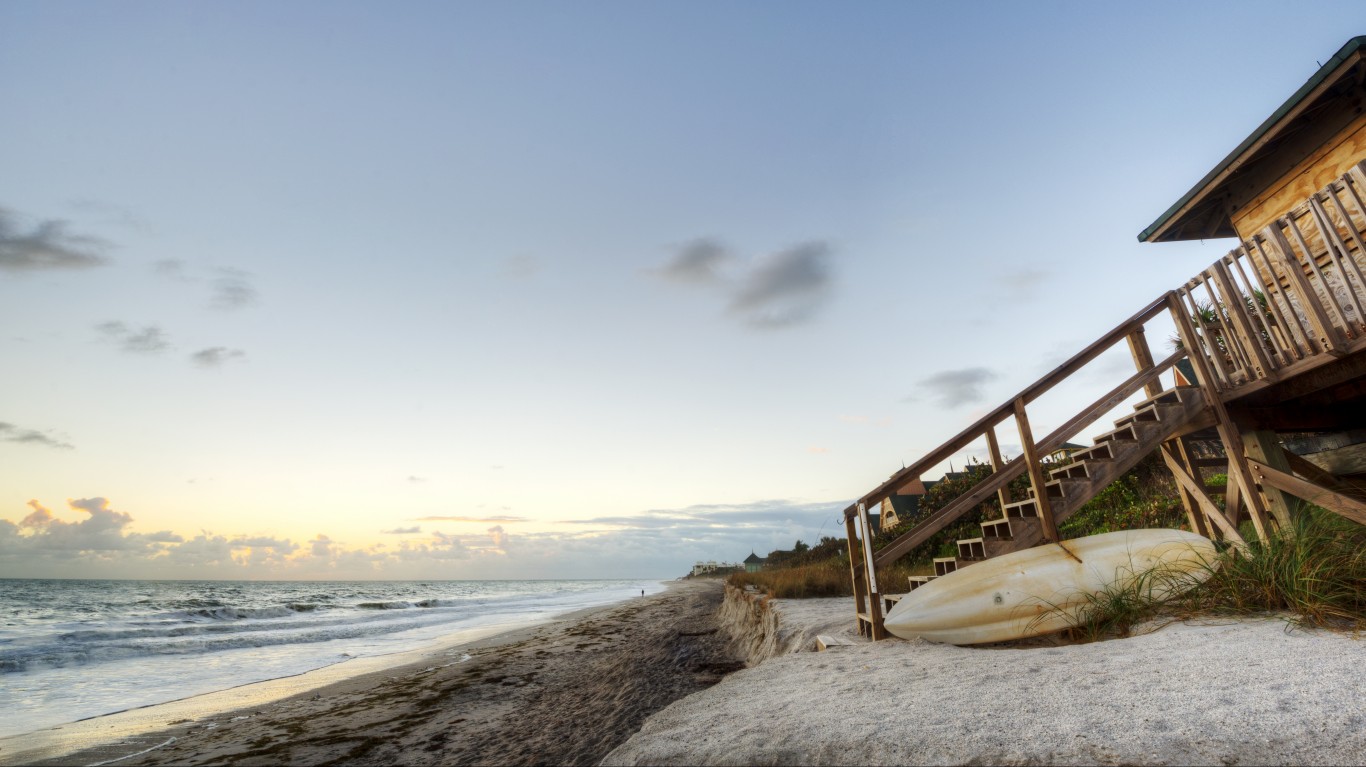
37. Sebastian, Florida
> Population: 23,432
> Recorded hurricanes since 1970: 21
> Last hurricane: Matthew, 2016
[in-text-ad-2]
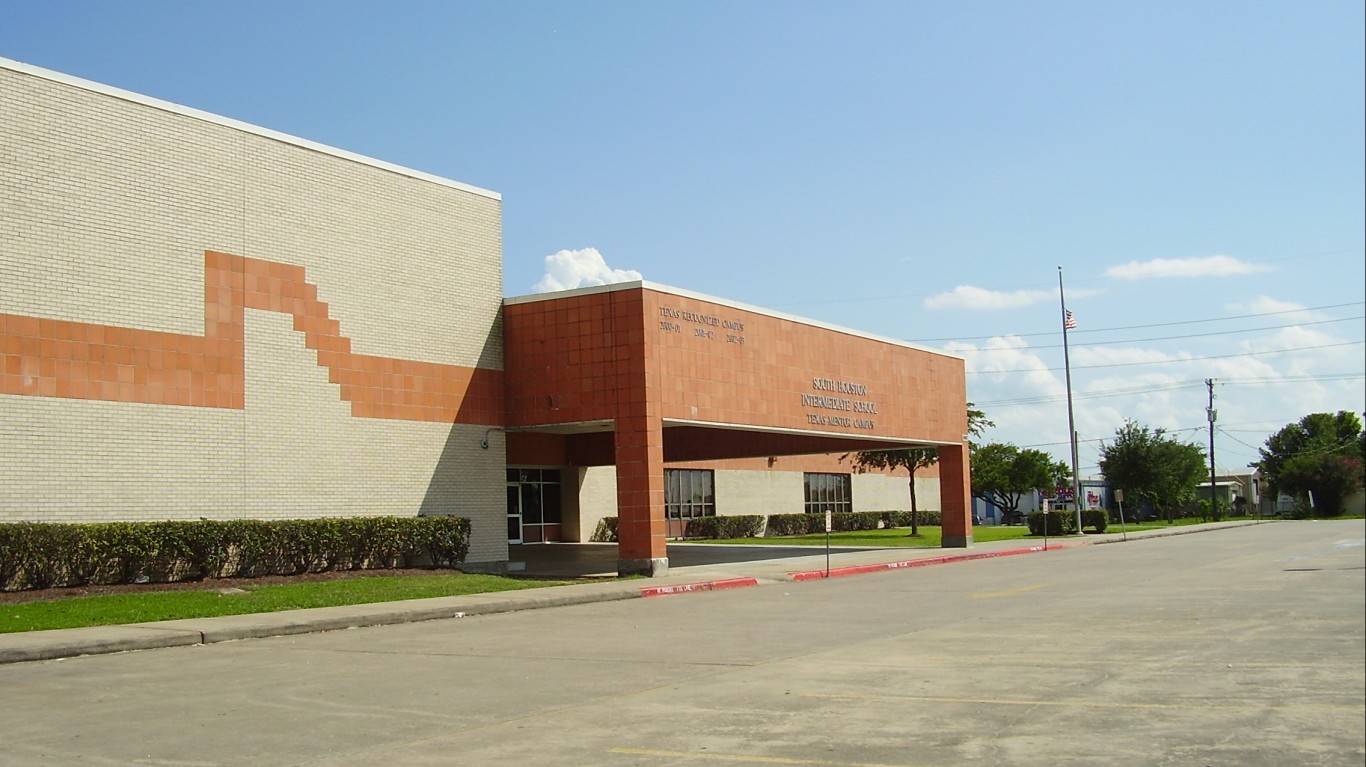
36. South Houston, Texas
> Population: 17,474
> Recorded hurricanes since 1970: 21
> Last hurricane: Ike, 2008
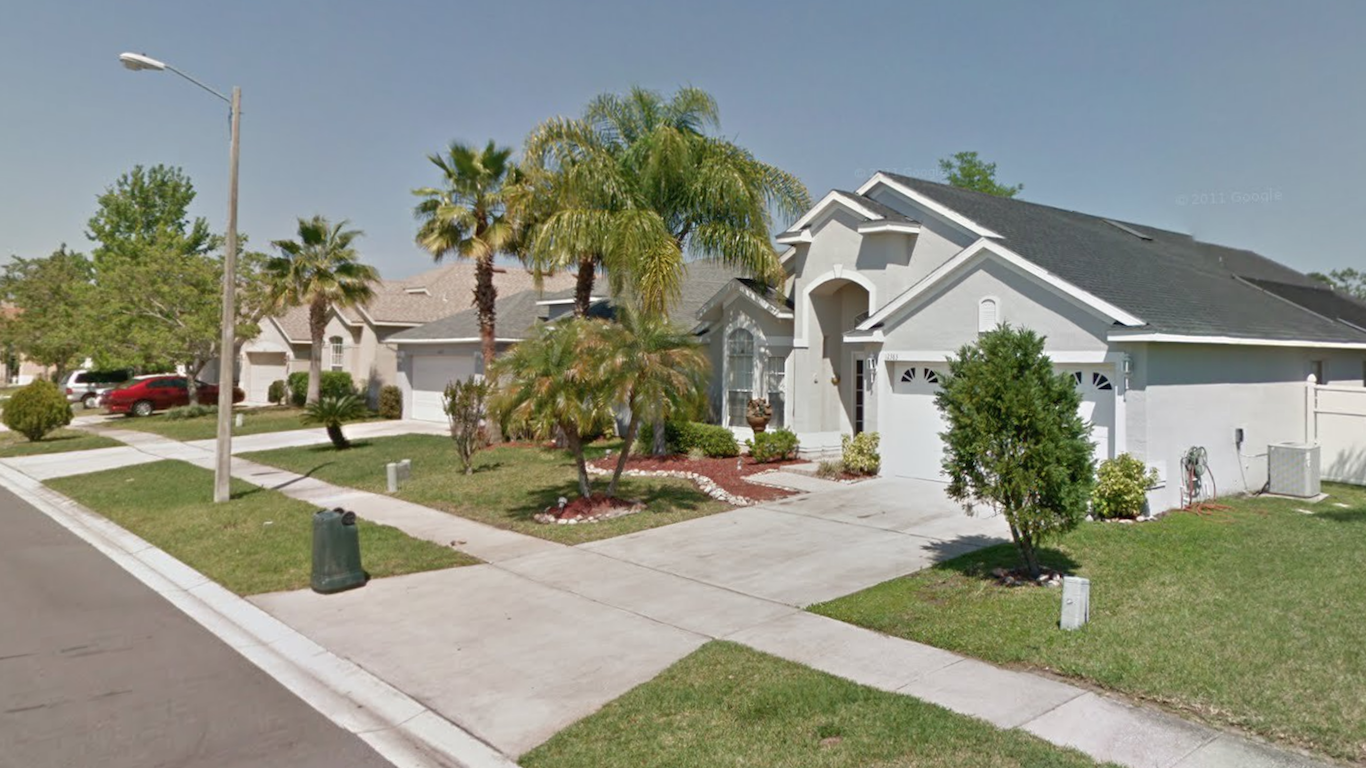
35. Southchase, Florida
> Population: 16,201
> Recorded hurricanes since 1970: 21
> Last hurricane: Julia, 2016
[in-text-ad]
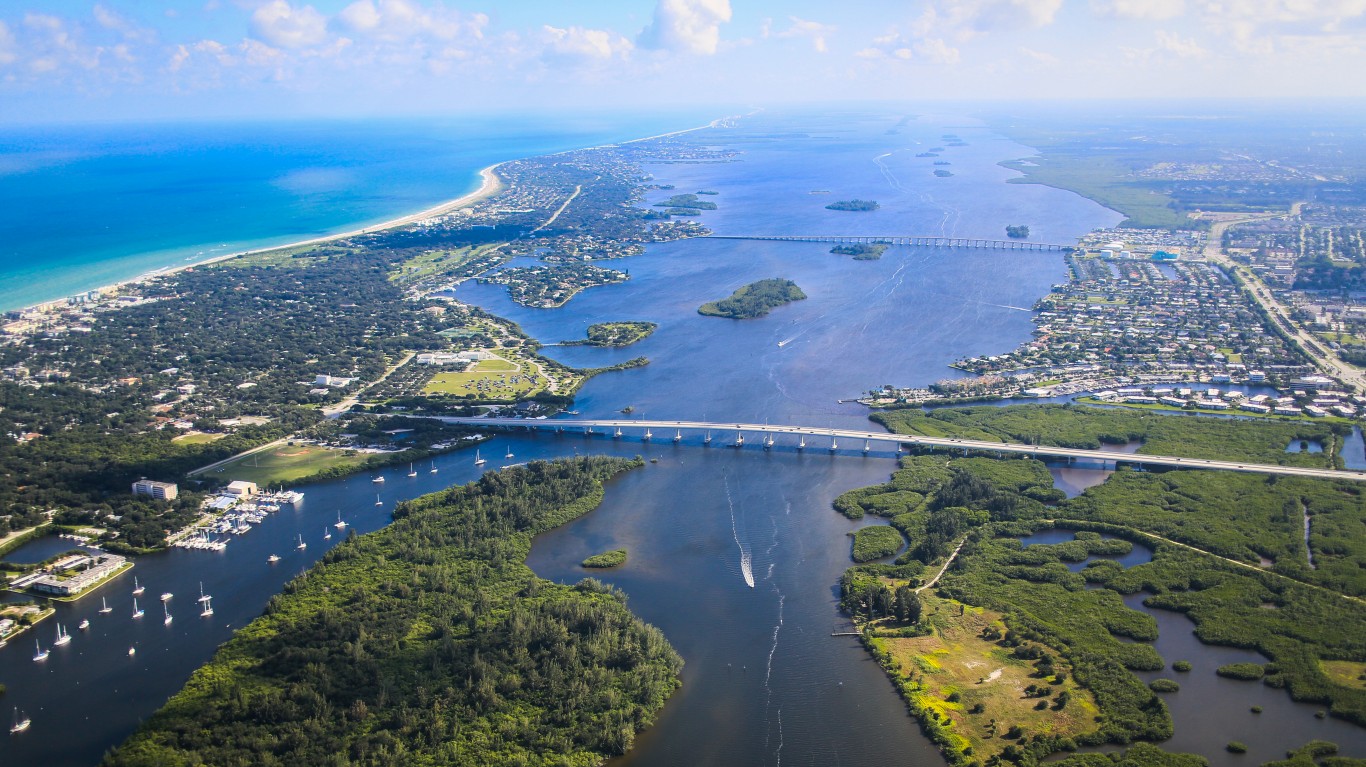
34. Vero Beach South, Florida
> Population: 24,234
> Recorded hurricanes since 1970: 21
> Last hurricane: Matthew, 2016
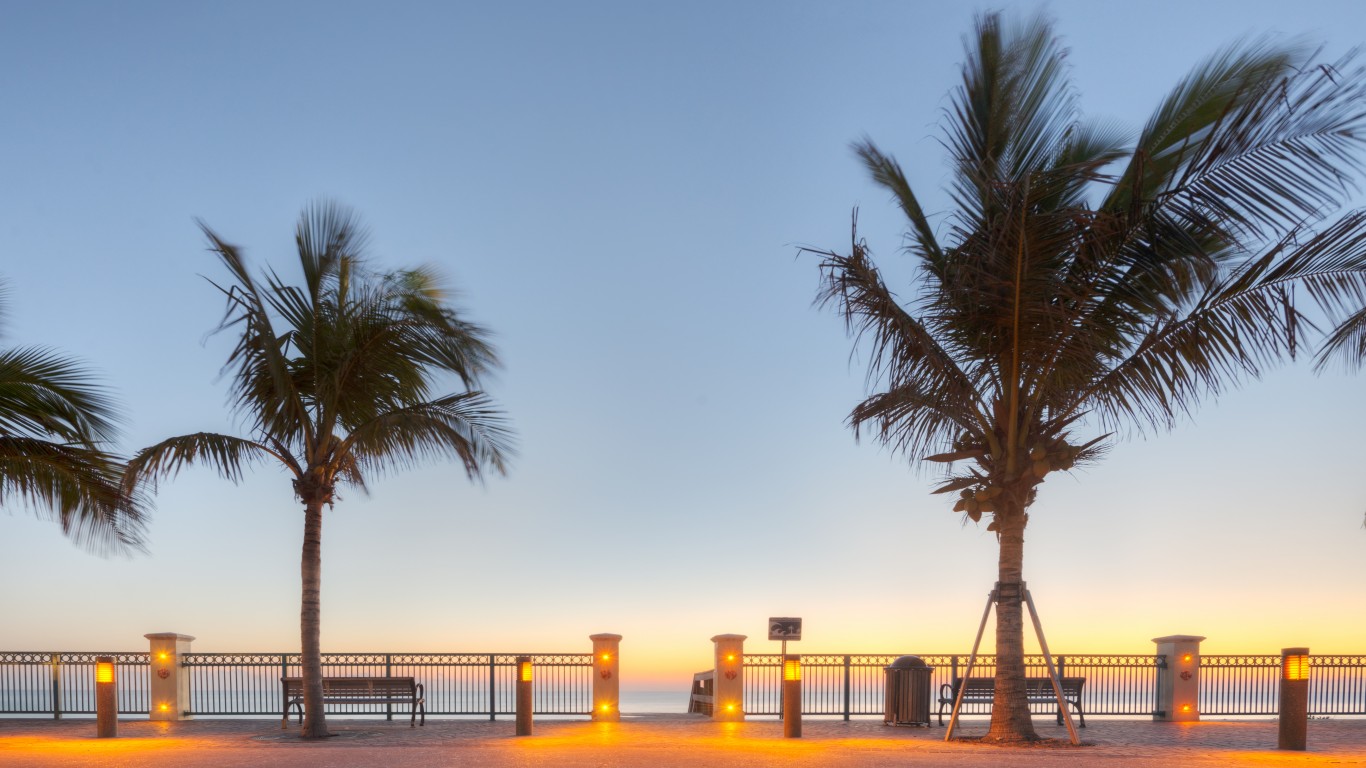
33. Vero Beach, Florida
> Population: 16,070
> Recorded hurricanes since 1970: 21
> Last hurricane: Matthew, 2016

32. Webster, Texas
> Population: 11,041
> Recorded hurricanes since 1970: 21
> Last hurricane: Ike, 2008
[in-text-ad-2]
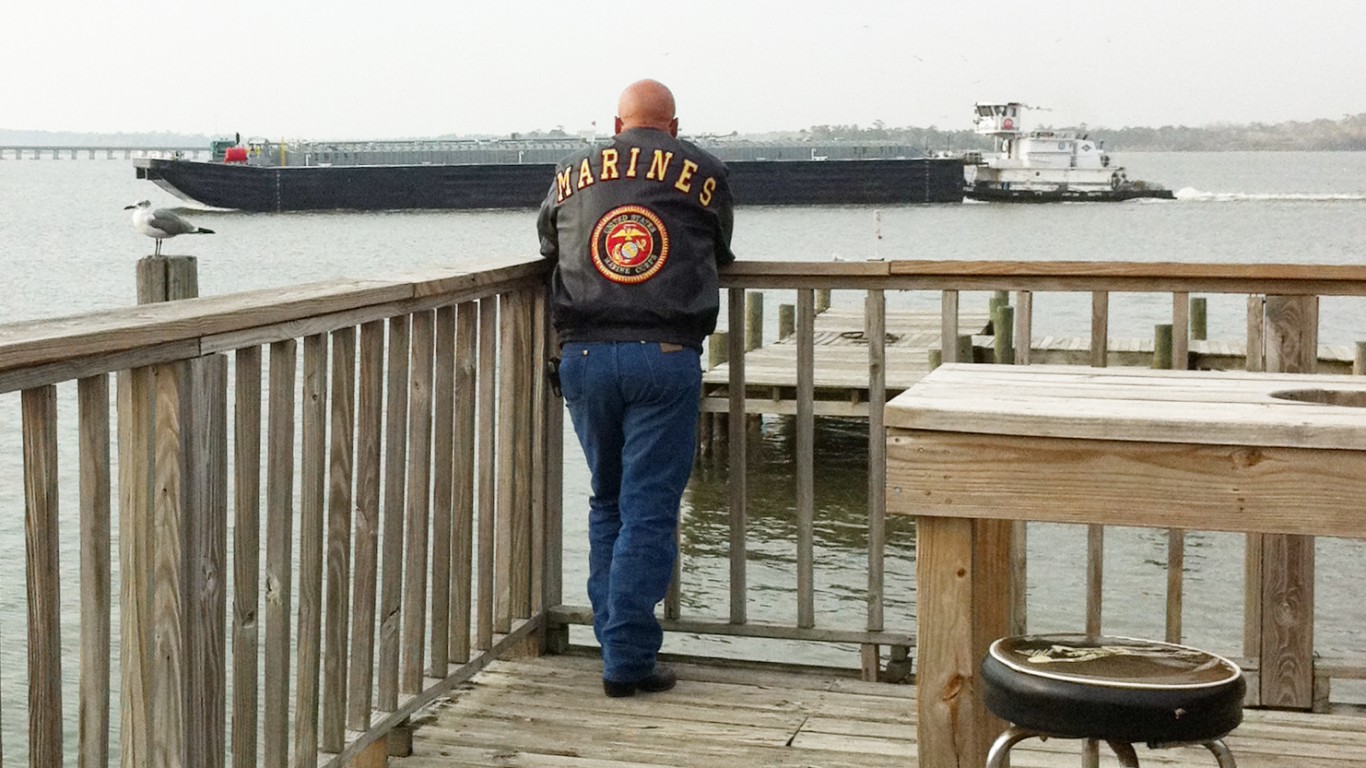
31. Channelview, Texas
> Population: 40,534
> Recorded hurricanes since 1970: 22
> Last hurricane: Ike, 2008
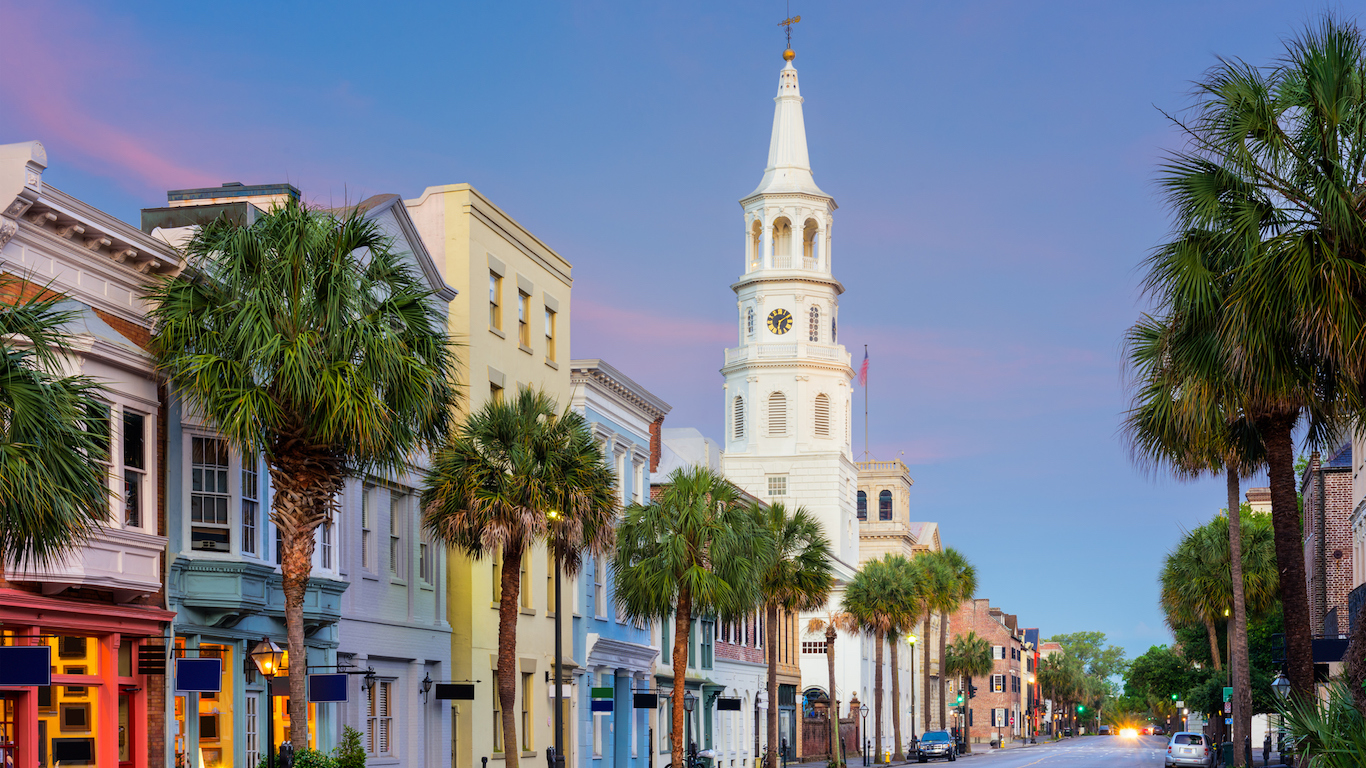
30. Charleston, South Carolina
> Population: 129,888
> Recorded hurricanes since 1970: 22
> Last hurricane: Matthew, 2016
[in-text-ad]
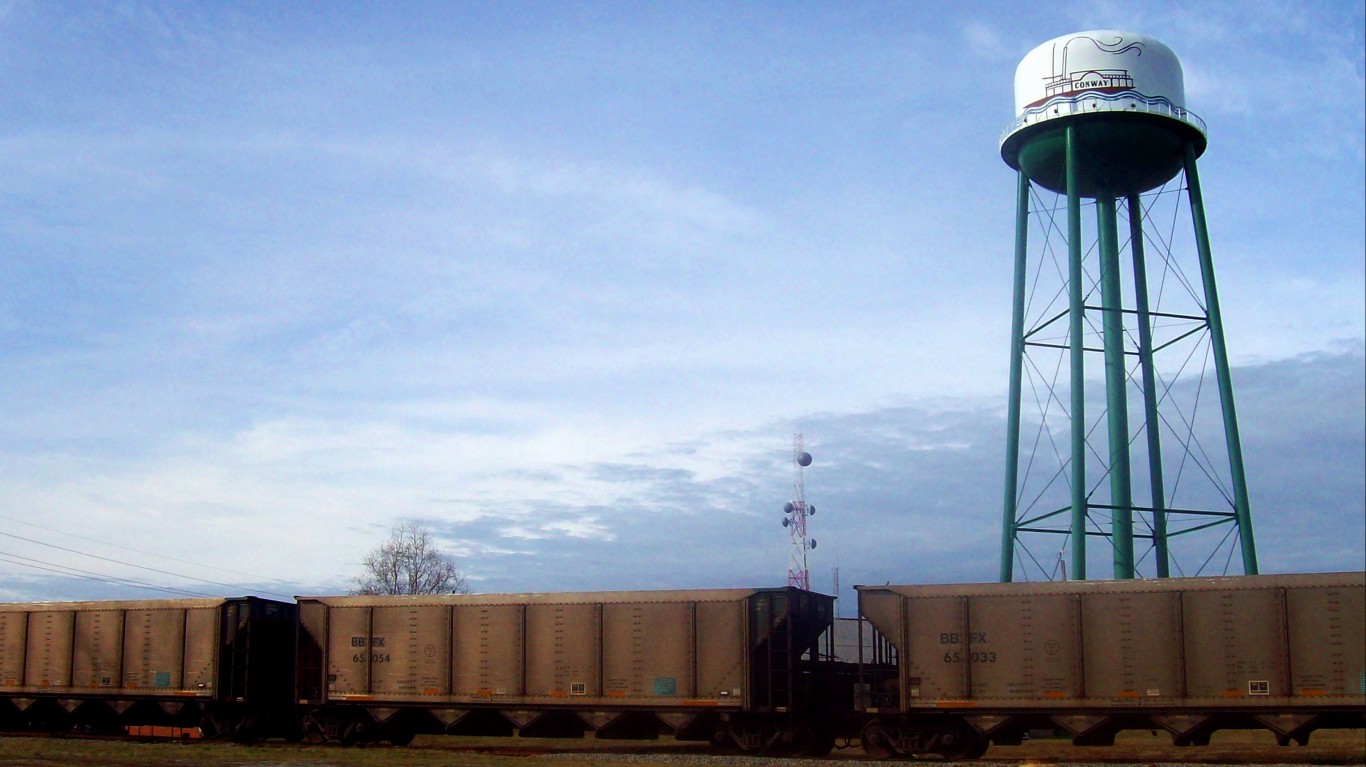
29. Conway, South Carolina
> Population: 20,631
> Recorded hurricanes since 1970: 22
> Last hurricane: Matthew, 2016
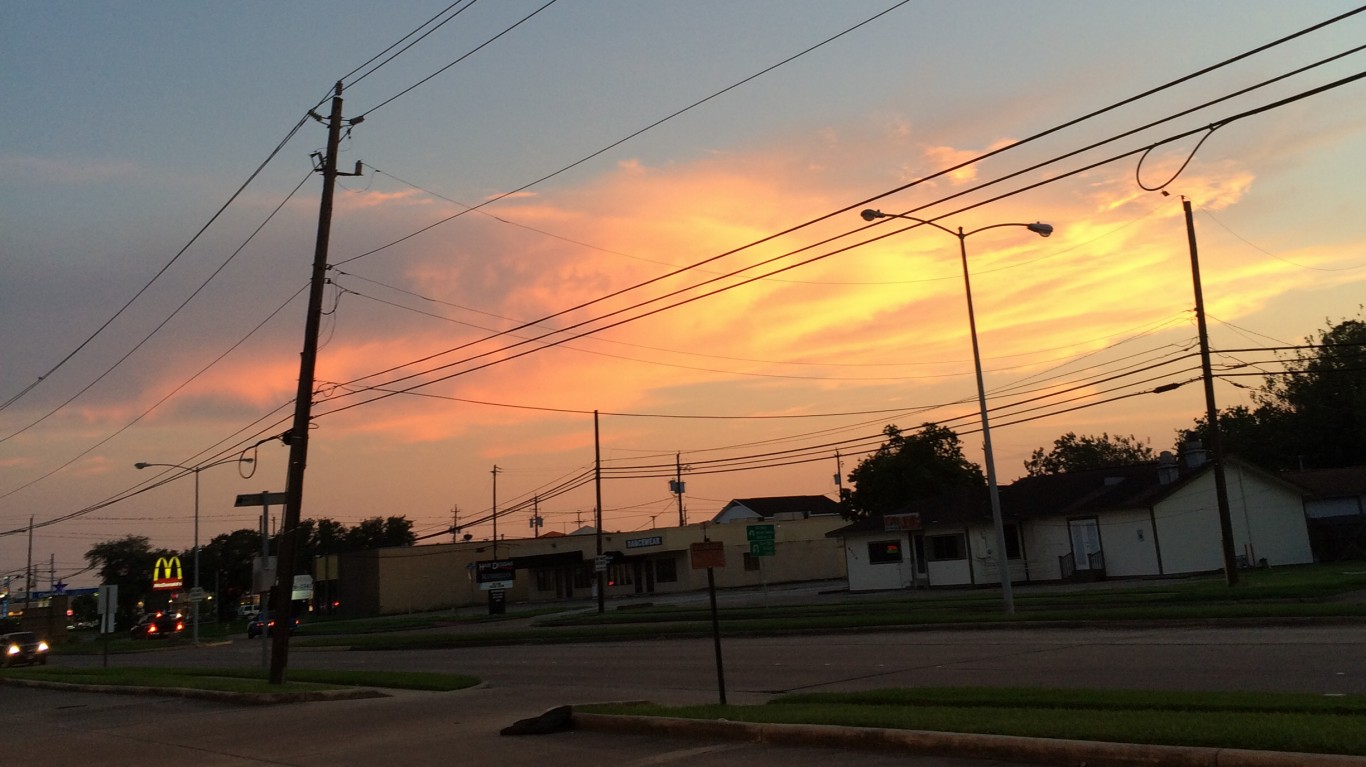
28. Deer Park, Texas
> Population: 33,517
> Recorded hurricanes since 1970: 22
> Last hurricane: Ike, 2008
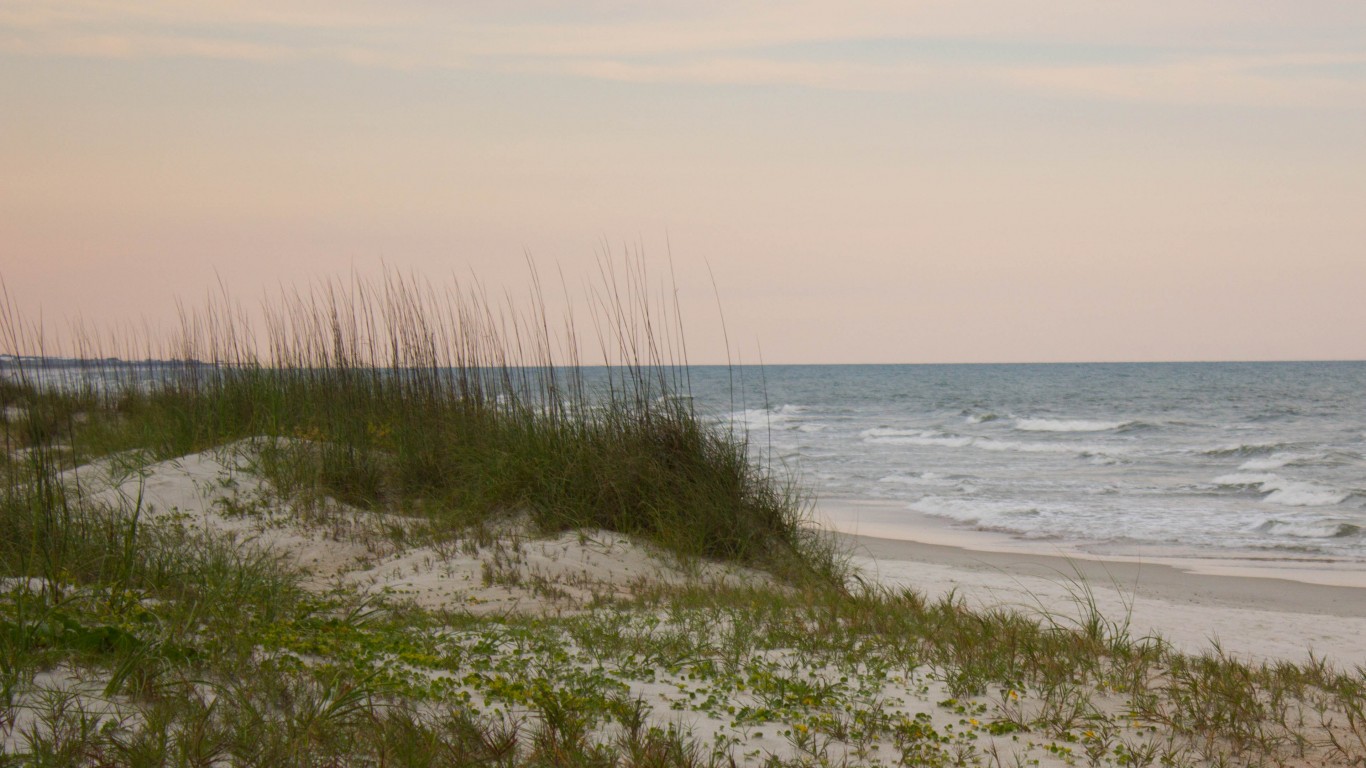
27. Fernandina Beach, Florida
> Population: 12,156
> Recorded hurricanes since 1970: 22
> Last hurricane: Julia, 2016
[in-text-ad-2]

26. Hanahan, South Carolina
> Population: 20,710
> Recorded hurricanes since 1970: 22
> Last hurricane: Matthew, 2016
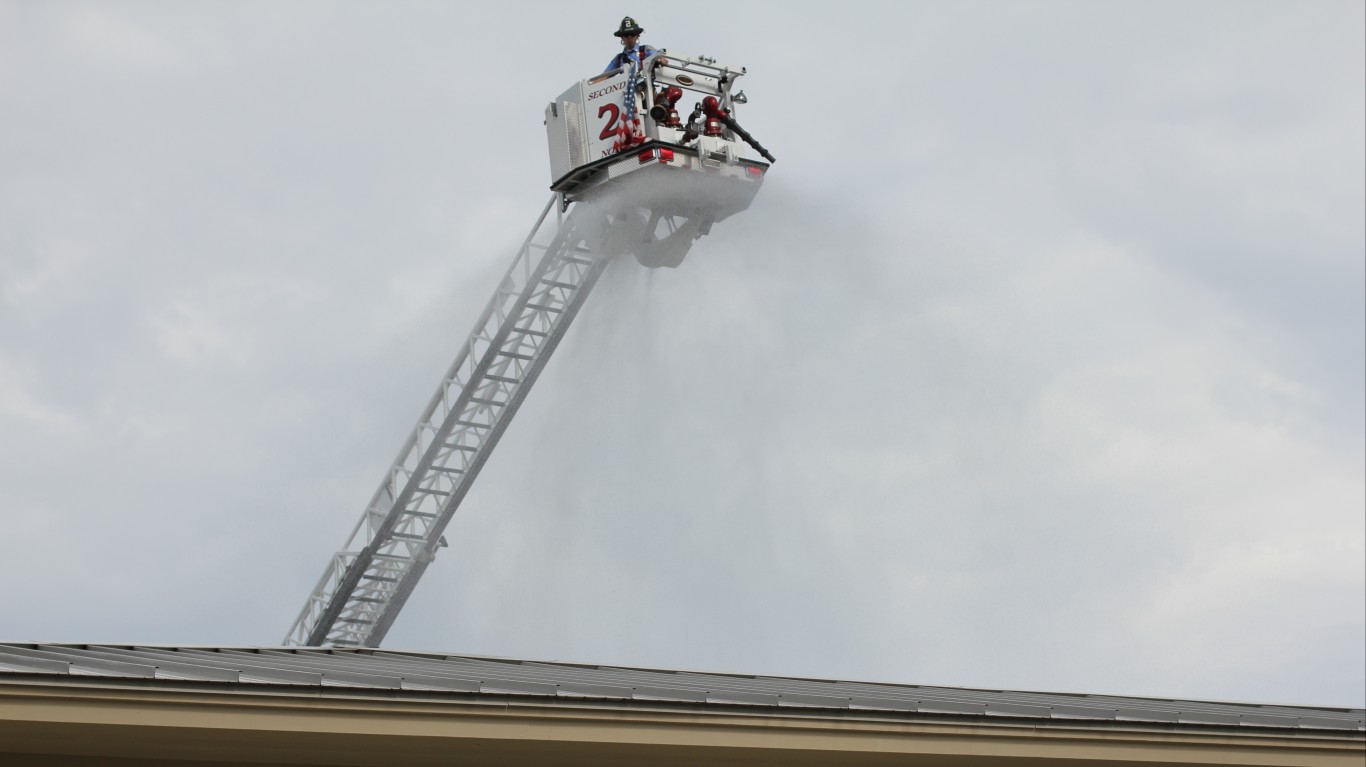
25. Ladson, South Carolina
> Population: 15,776
> Recorded hurricanes since 1970: 22
> Last hurricane: Matthew, 2016
[in-text-ad]
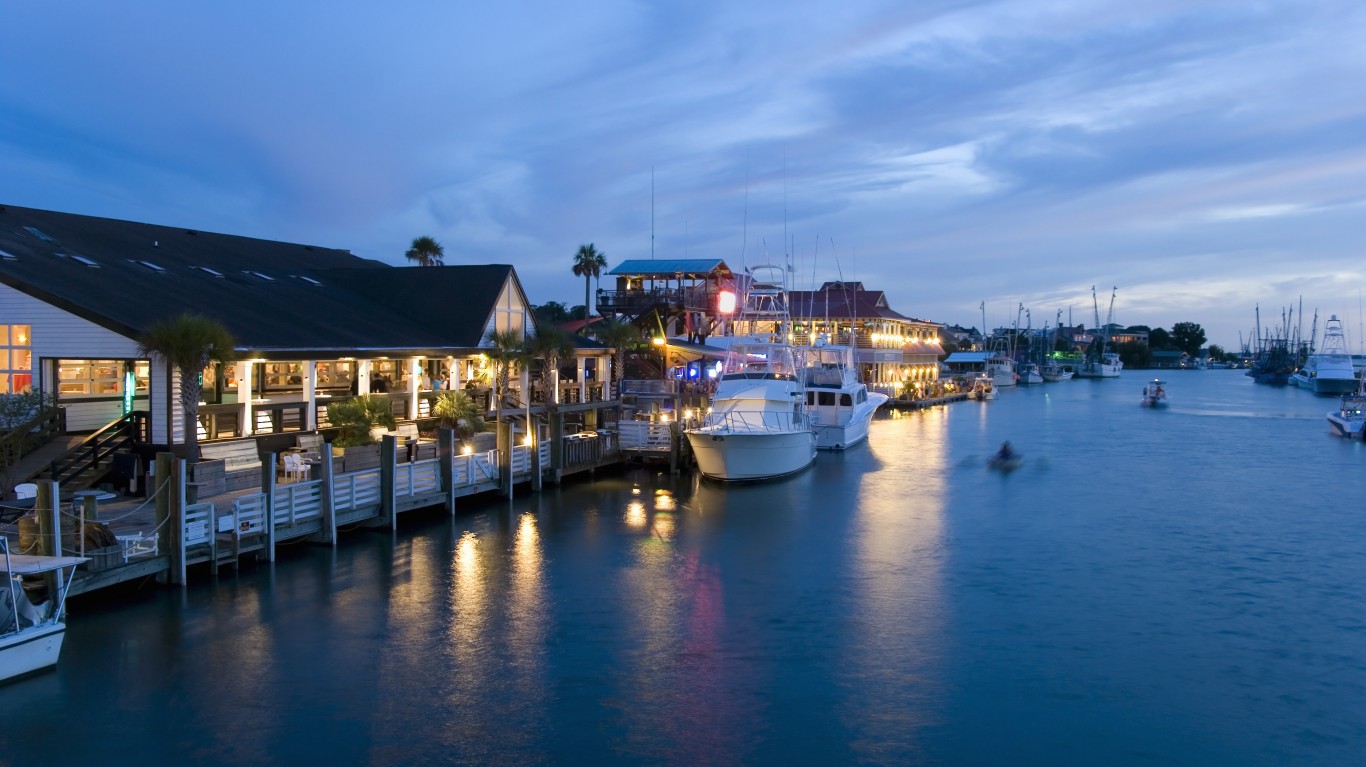
24. Mount Pleasant, South Carolina
> Population: 77,907
> Recorded hurricanes since 1970: 22
> Last hurricane: Matthew, 2016
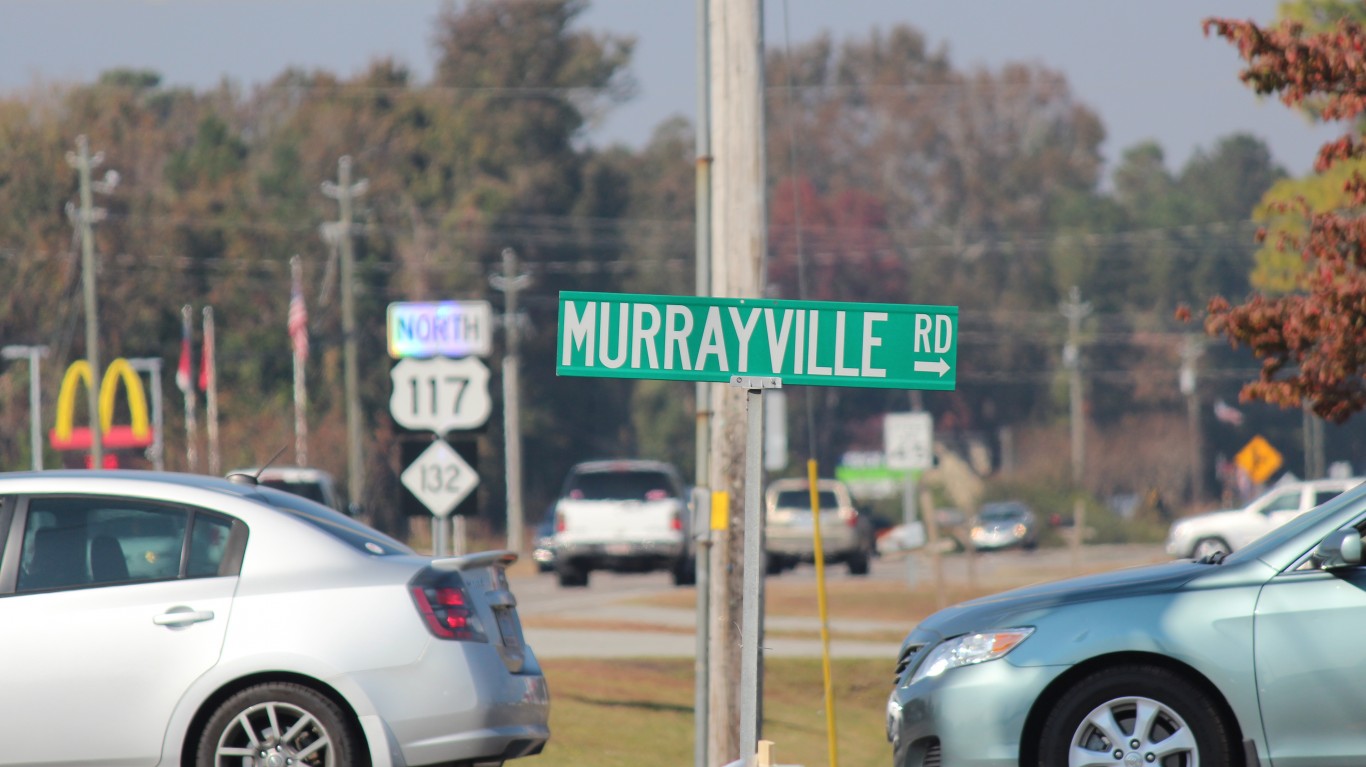
23. Murraysville, North Carolina
> Population: 14,843
> Recorded hurricanes since 1970: 22
> Last hurricane: Matthew, 2016
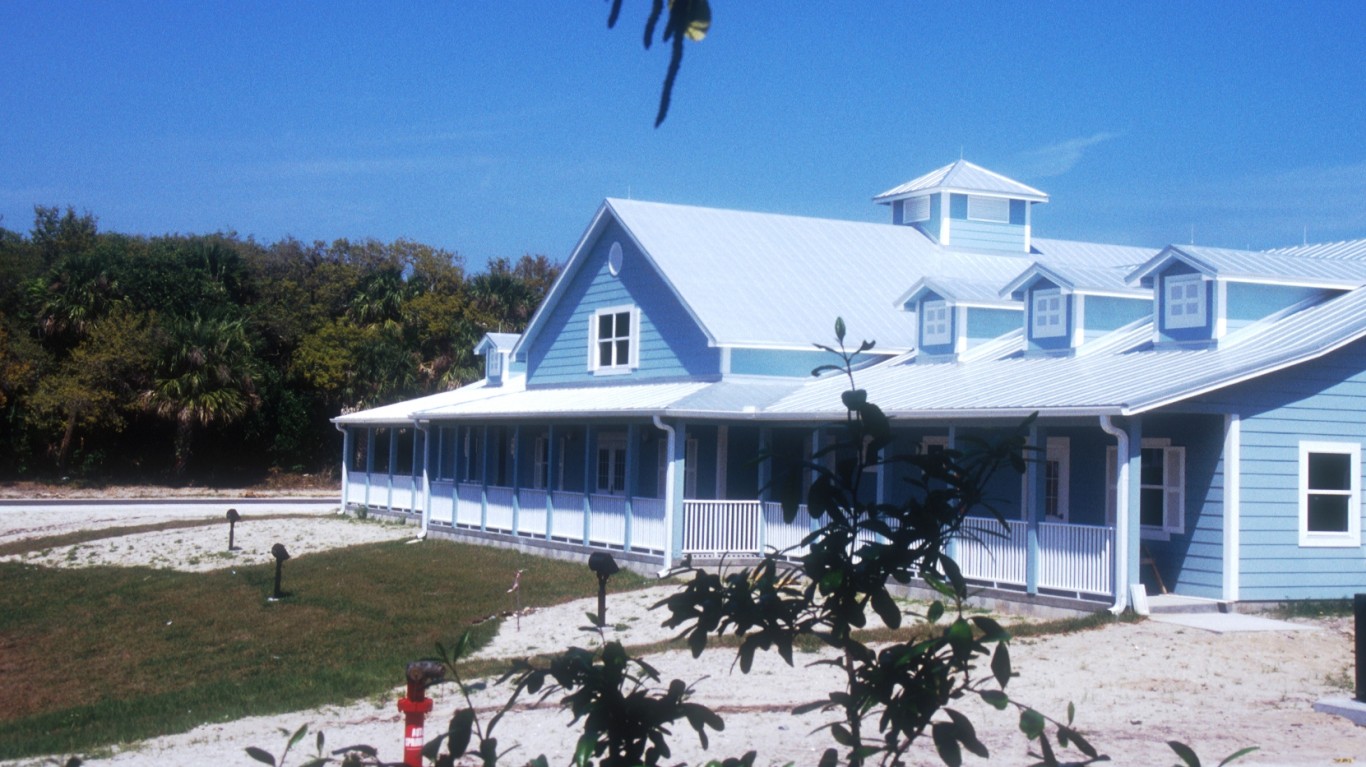
22. Palm Bay, Florida
> Population: 106,573
> Recorded hurricanes since 1970: 22
> Last hurricane: Julia, 2016
[in-text-ad-2]
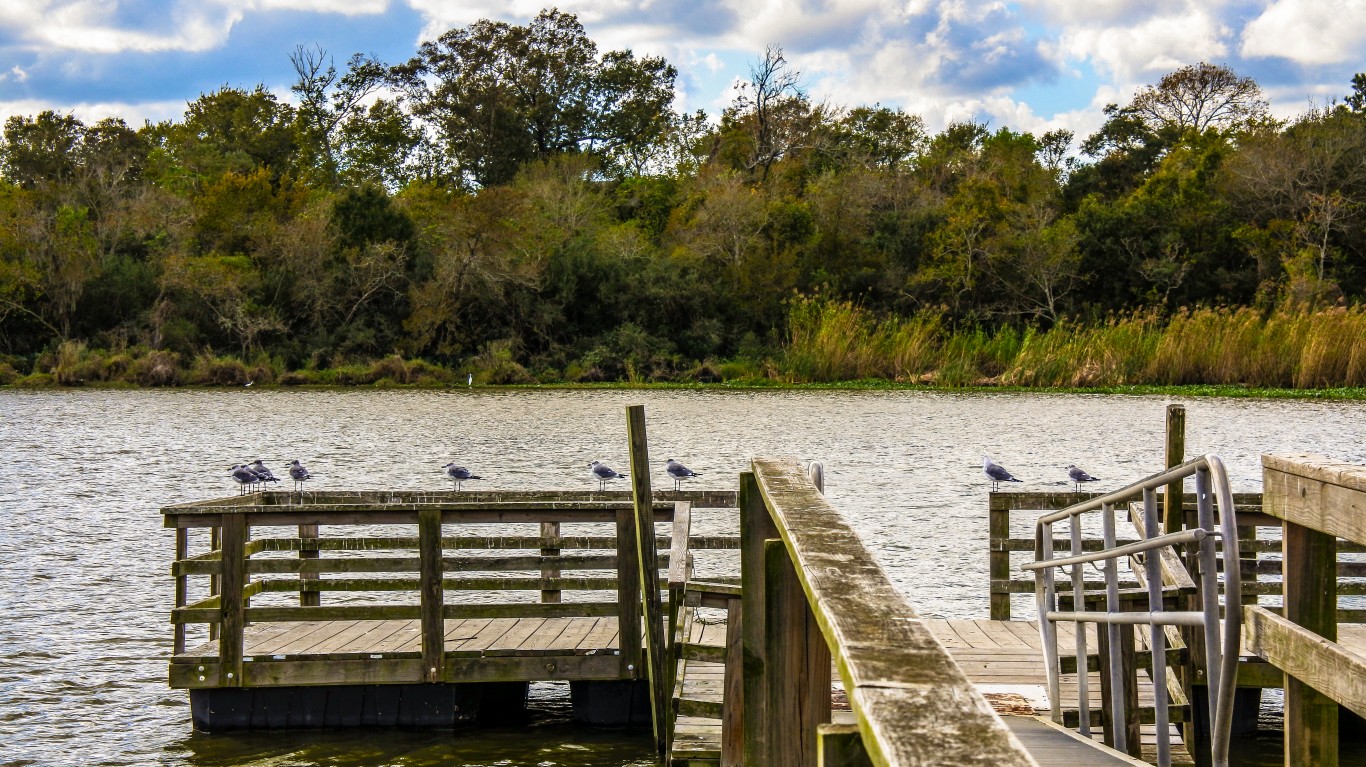
21. Pasadena, Texas
> Population: 153,286
> Recorded hurricanes since 1970: 22
> Last hurricane: Ike, 2008
[Need Manual Image]
20. Red Hill, South Carolina
> Population: 14,251
> Recorded hurricanes since 1970: 22
> Last hurricane: Matthew, 2016
[in-text-ad]
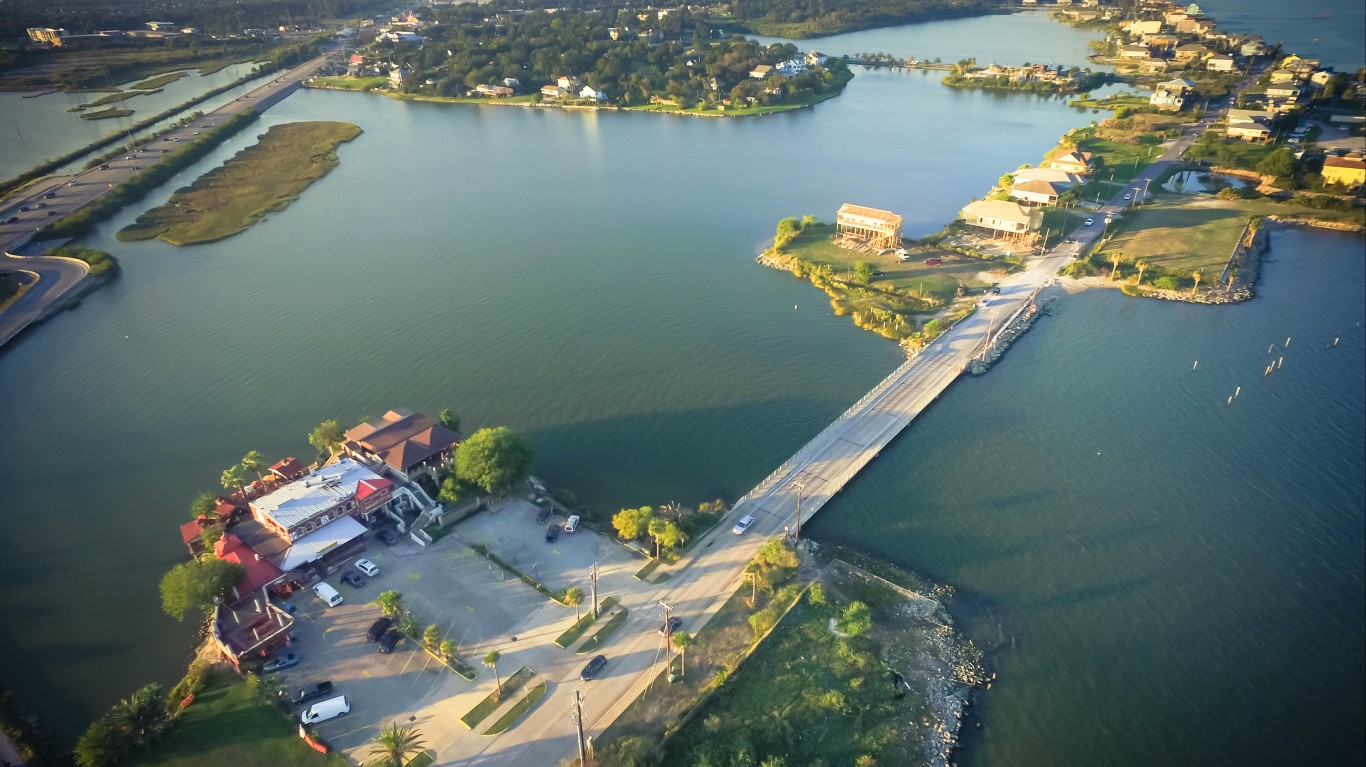
19. Seabrook, Texas
> Population: 13,038
> Recorded hurricanes since 1970: 22
> Last hurricane: Ike, 2008
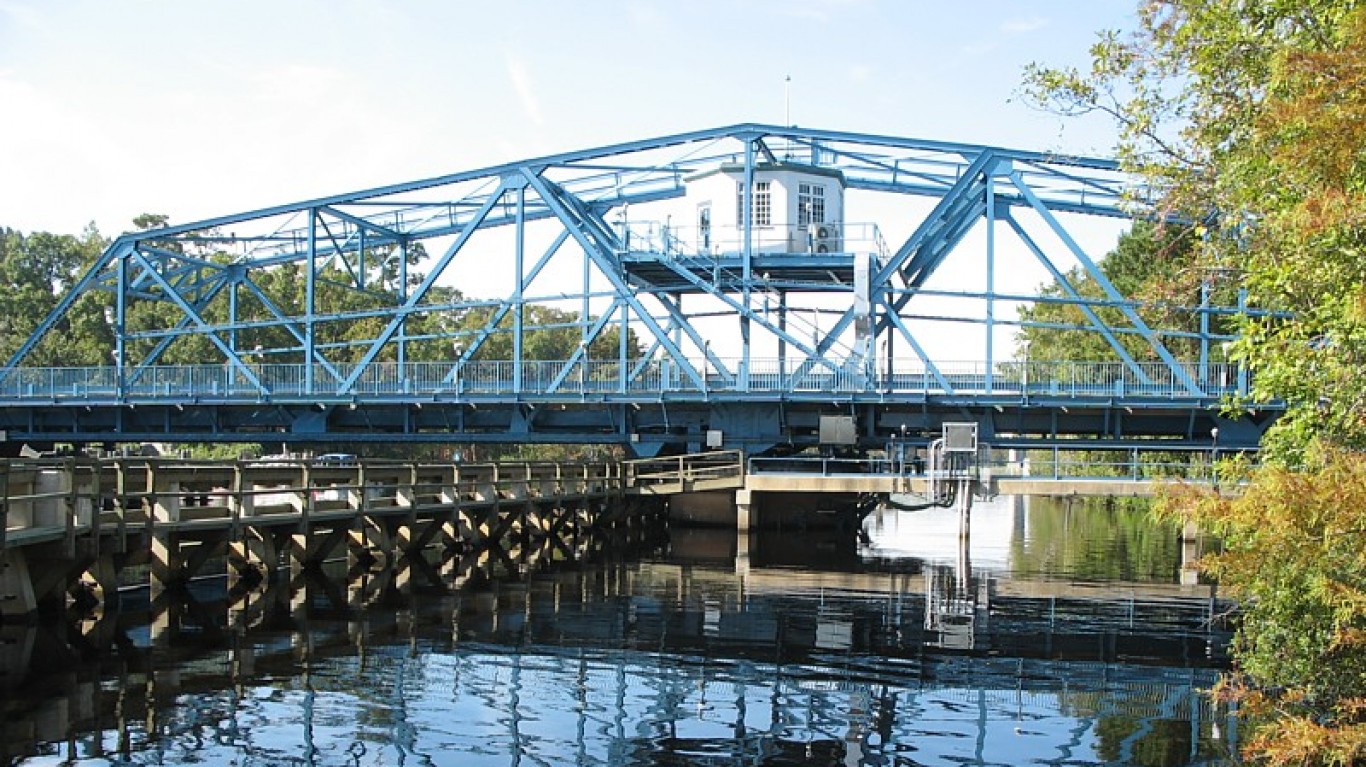
18. Socastee, South Carolina
> Population: 22,786
> Recorded hurricanes since 1970: 22
> Last hurricane: Matthew, 2016
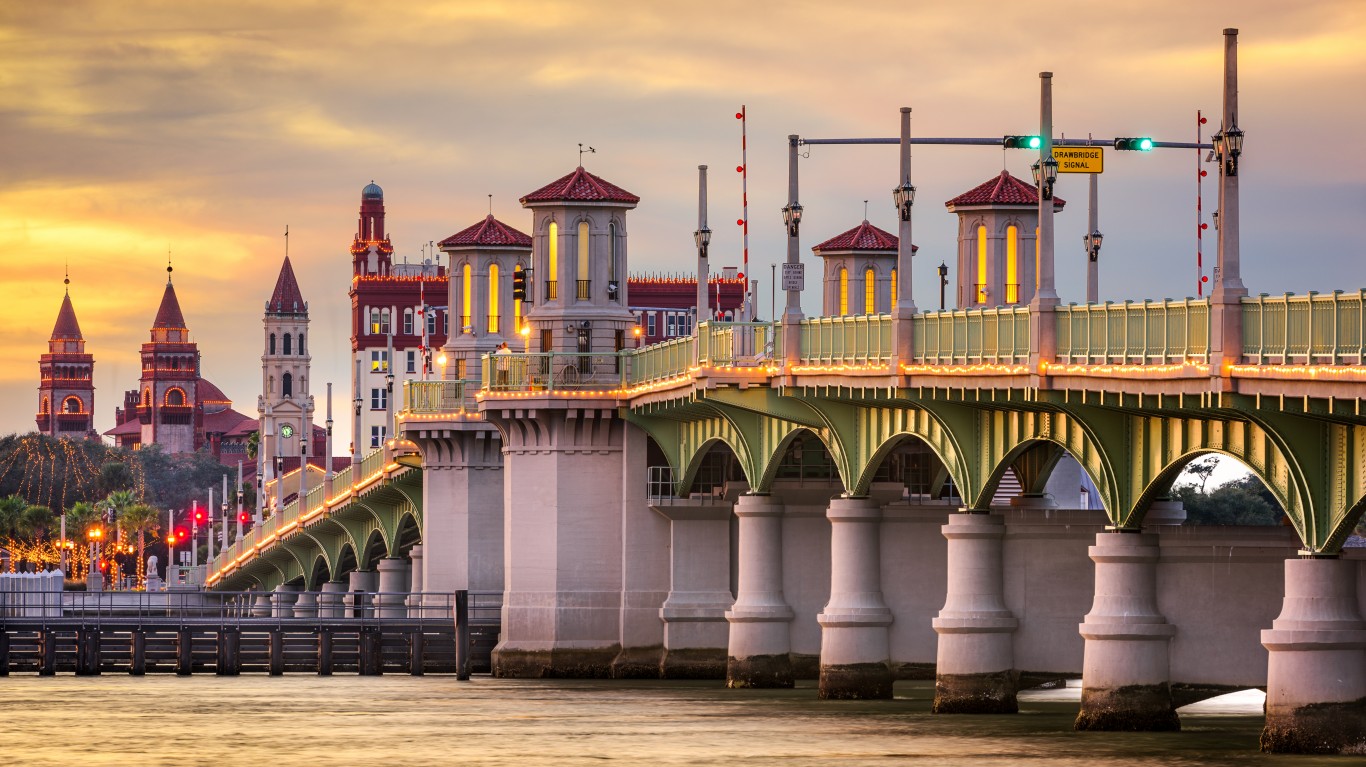
17. St. Augustine, Florida
> Population: 13,867
> Recorded hurricanes since 1970: 22
> Last hurricane: Matthew, 2016
[in-text-ad-2]
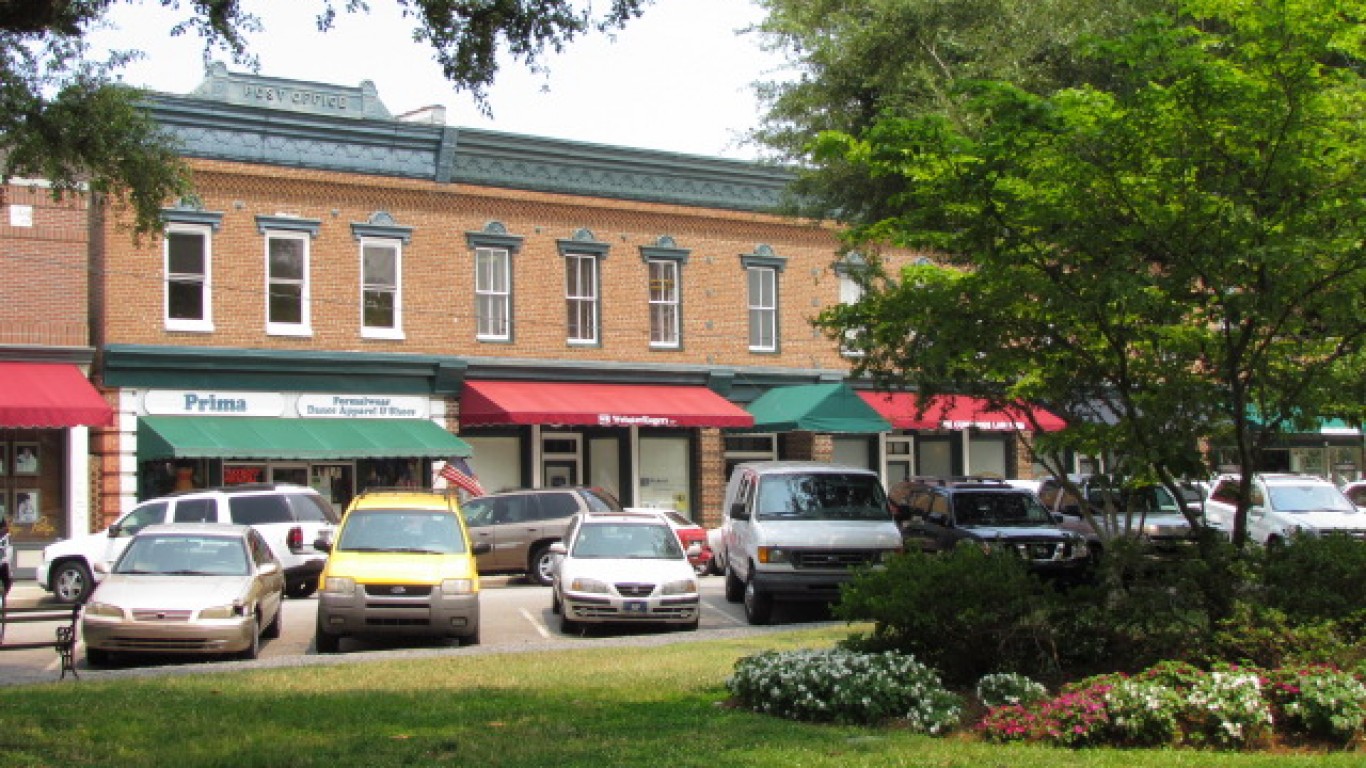
16. Summerville, South Carolina
> Population: 47,919
> Recorded hurricanes since 1970: 22
> Last hurricane: Matthew, 2016

15. Wilmington Island, Georgia
> Population: 15,005
> Recorded hurricanes since 1970: 22
> Last hurricane: Matthew, 2016
[in-text-ad]
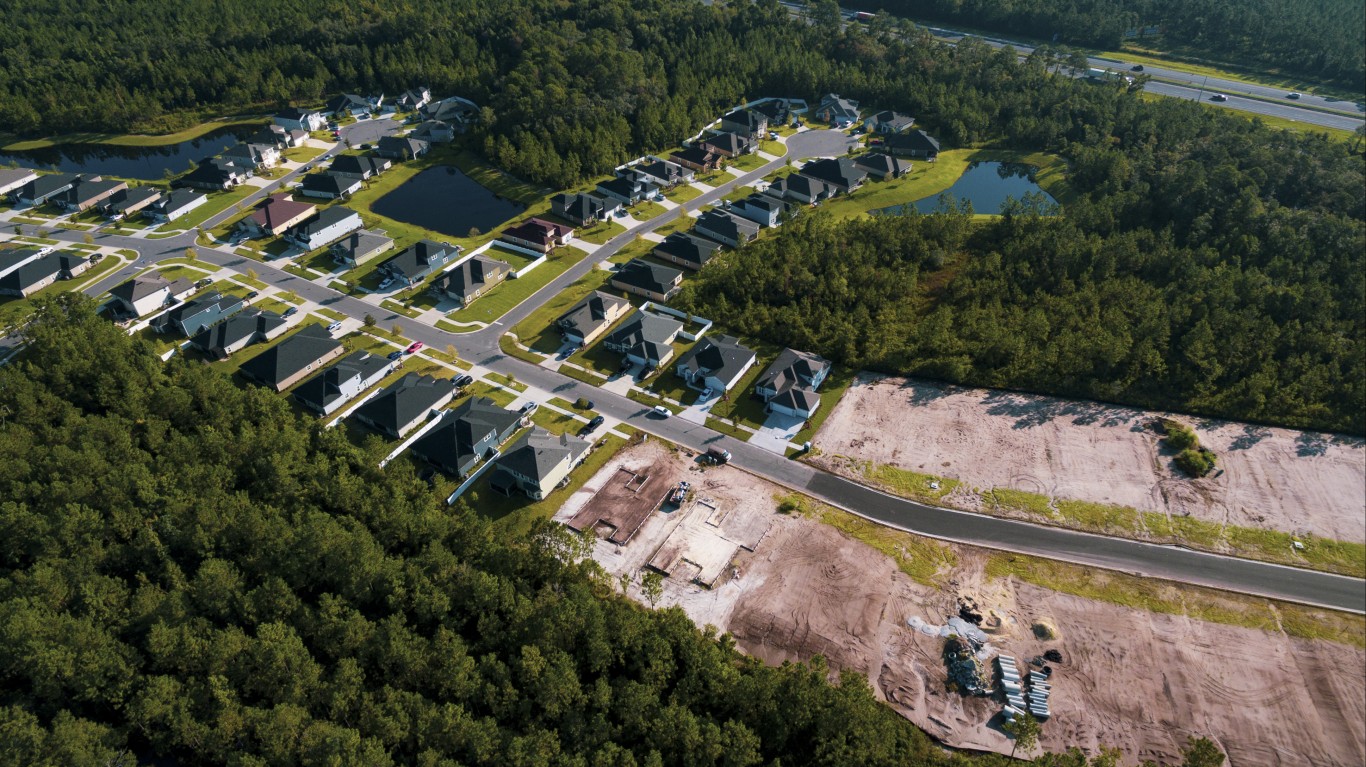
14. Yulee, Florida
> Population: 12,217
> Recorded hurricanes since 1970: 22
> Last hurricane: Julia, 2016
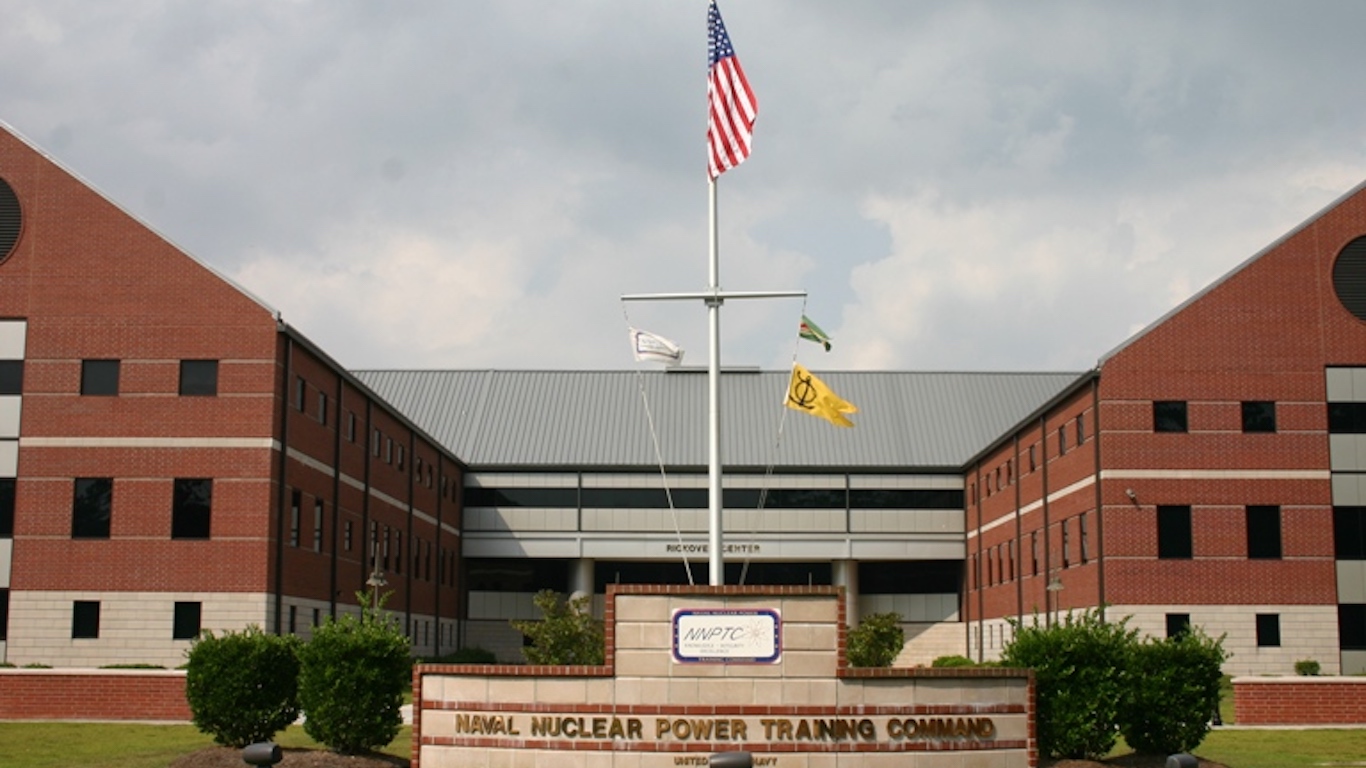
13. Goose Creek, South Carolina
> Population: 40,553
> Recorded hurricanes since 1970: 23
> Last hurricane: Matthew, 2016
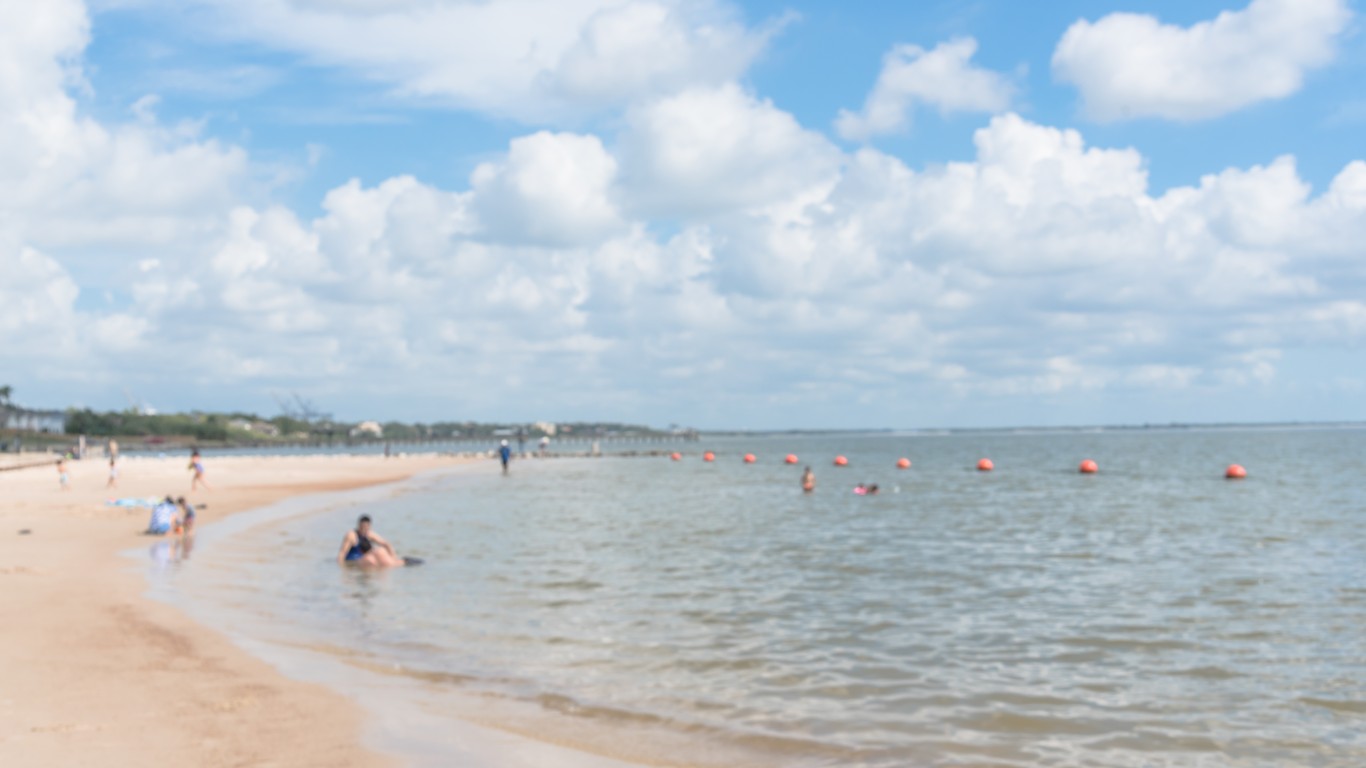
12. La Porte, Texas
> Population: 34,922
> Recorded hurricanes since 1970: 23
> Last hurricane: Ike, 2008
[in-text-ad-2]
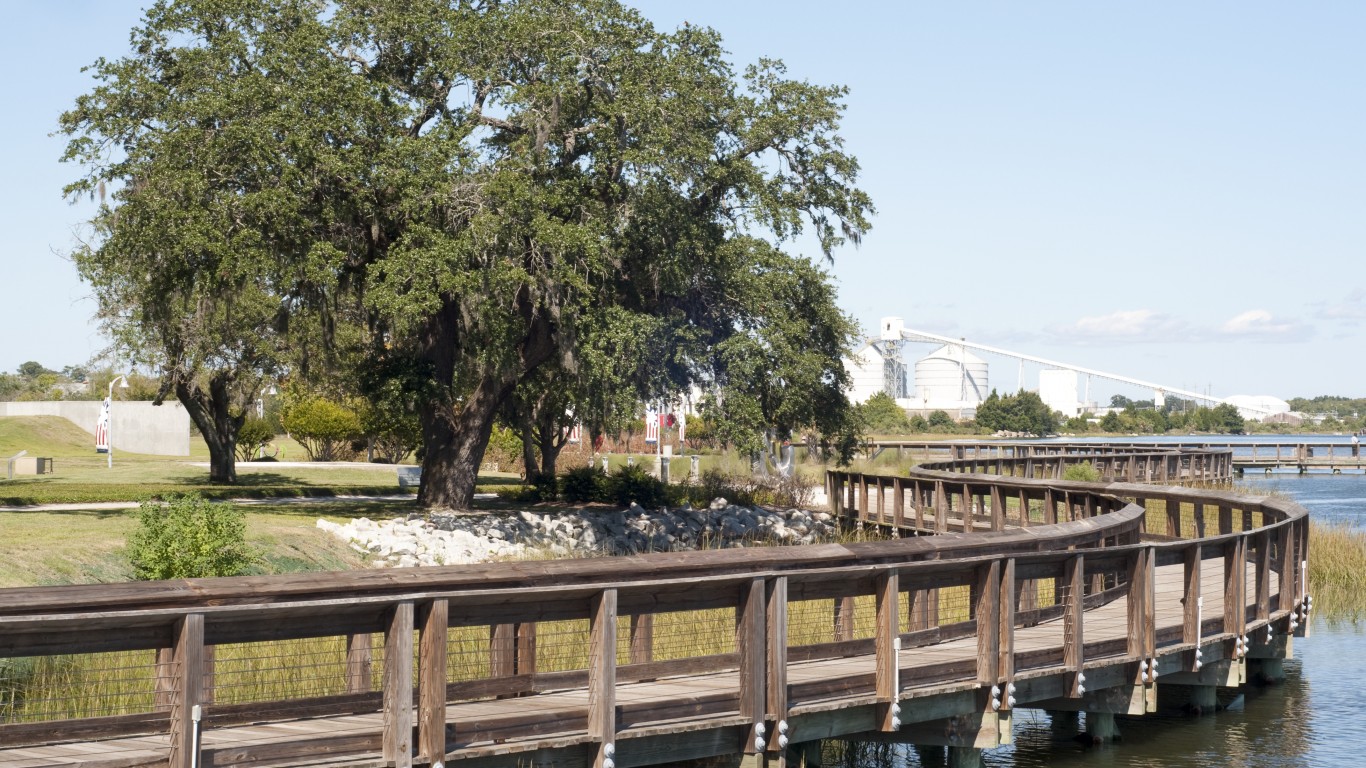
11. North Charleston, South Carolina
> Population: 106,113
> Recorded hurricanes since 1970: 23
> Last hurricane: Matthew, 2016
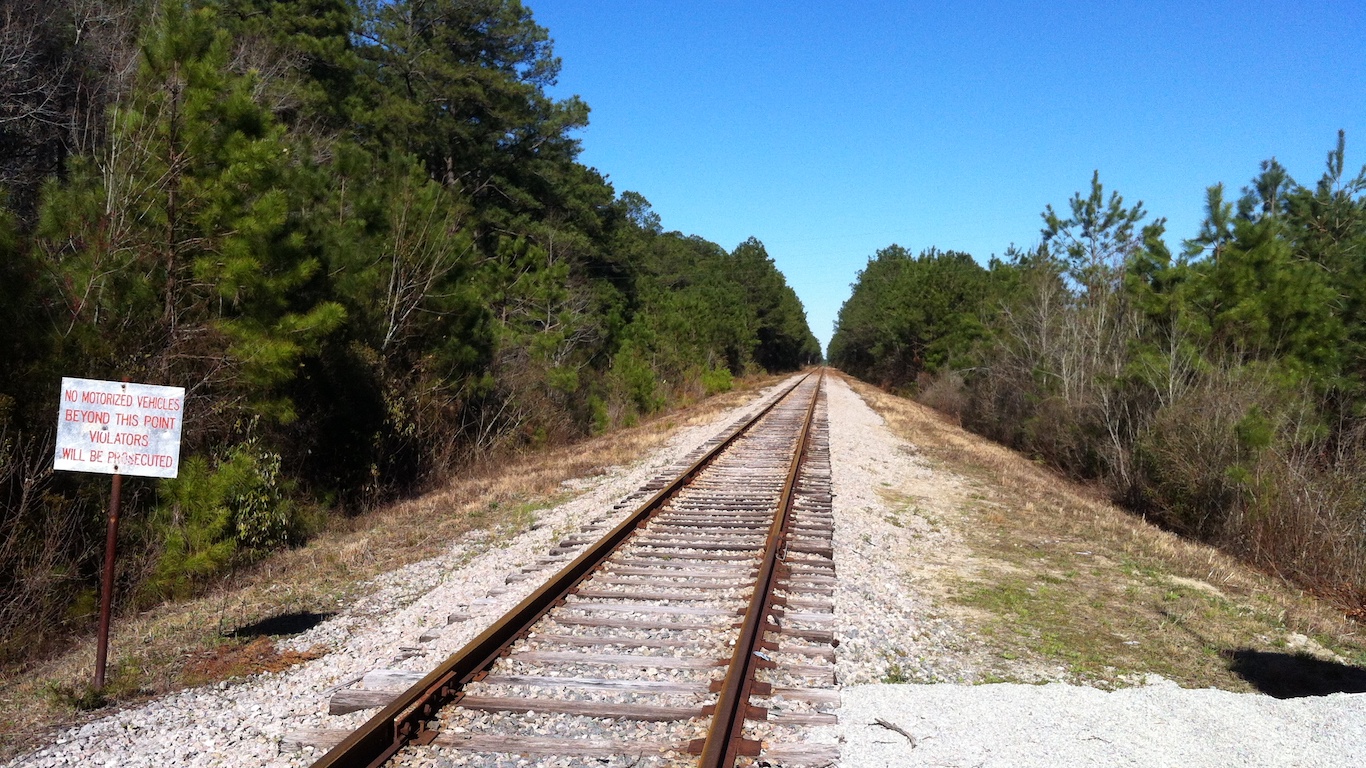
10. Piney Green, North Carolina
> Population: 13,427
> Recorded hurricanes since 1970: 23
> Last hurricane: Julia, 2016
[in-text-ad]
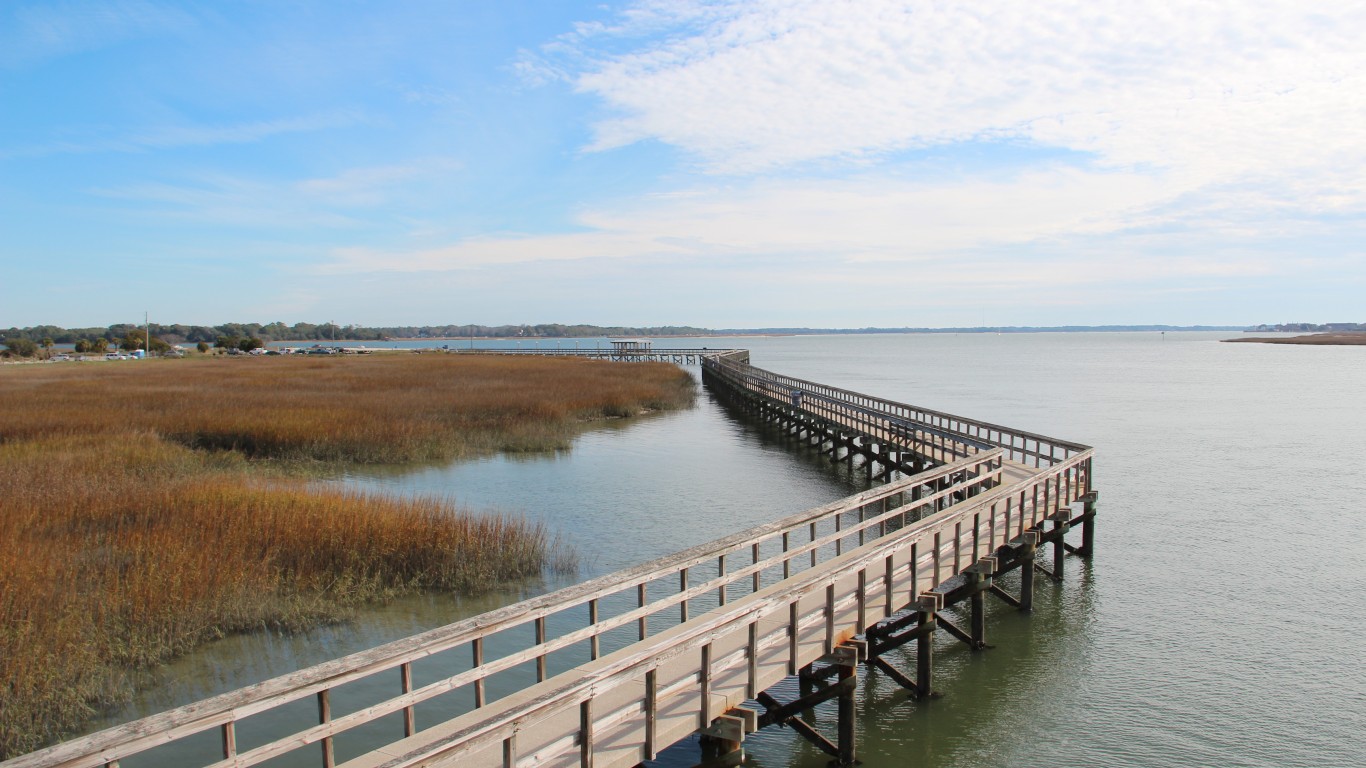
9. Port Royal, South Carolina
> Population: 11,891
> Recorded hurricanes since 1970: 23
> Last hurricane: Matthew, 2016
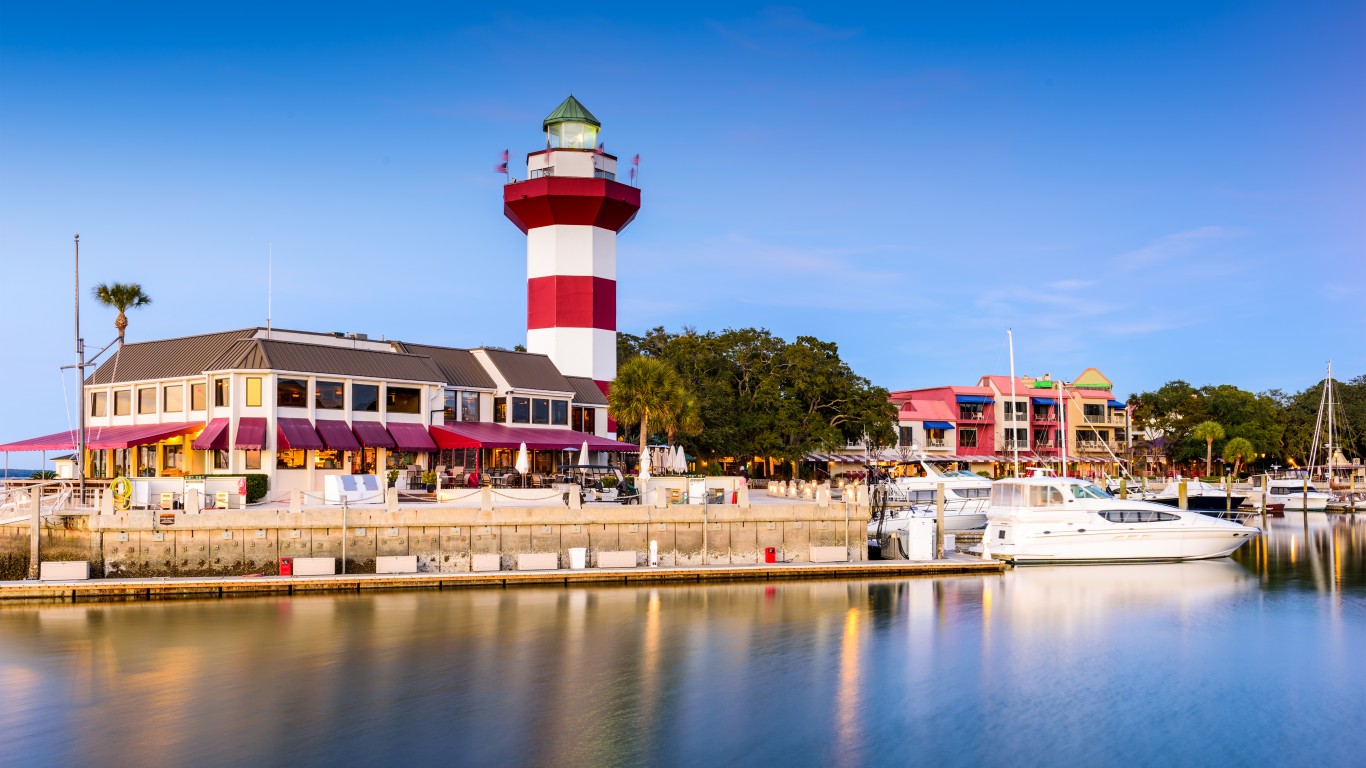
8. Hilton Head Island, South Carolina
> Population: 39,651
> Recorded hurricanes since 1970: 24
> Last hurricane: Matthew, 2016
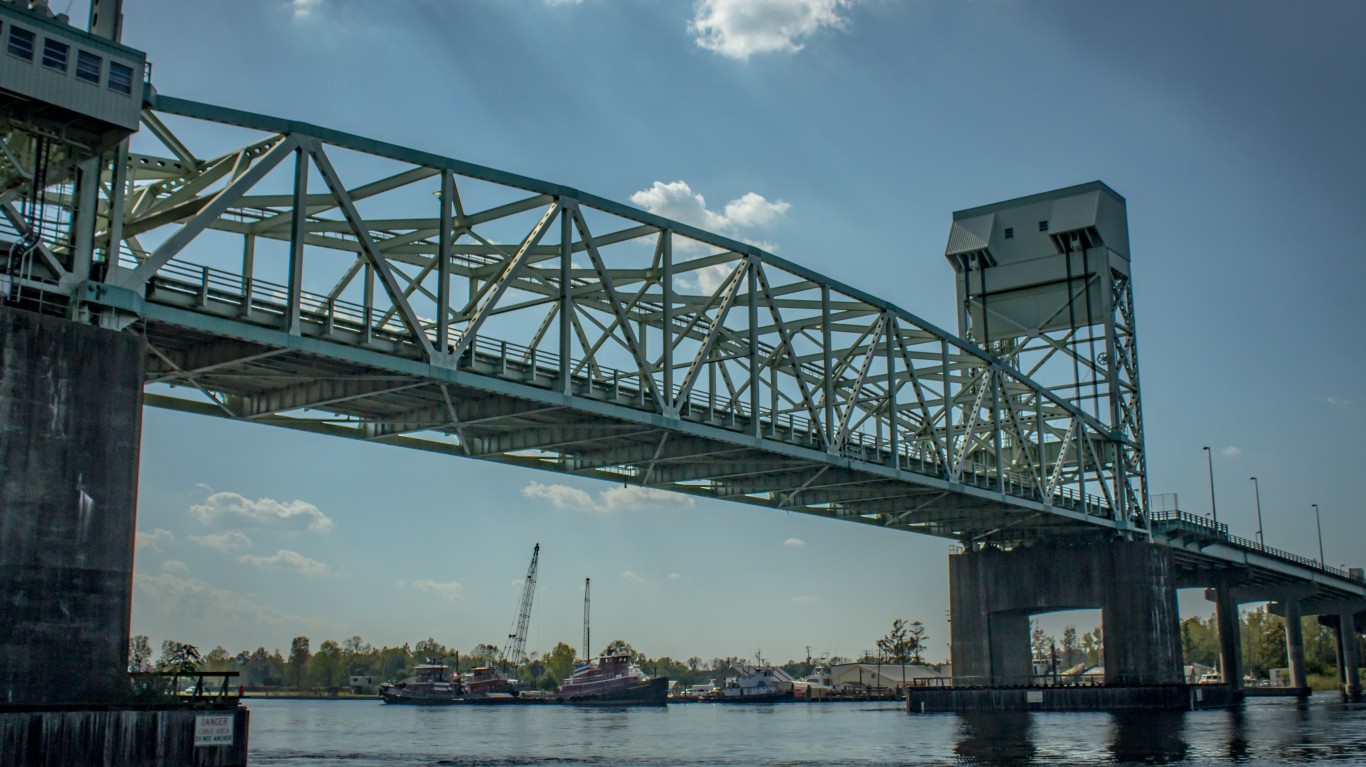
7. Leland, North Carolina
> Population: 17,023
> Recorded hurricanes since 1970: 24
> Last hurricane: Matthew, 2016
[in-text-ad-2]
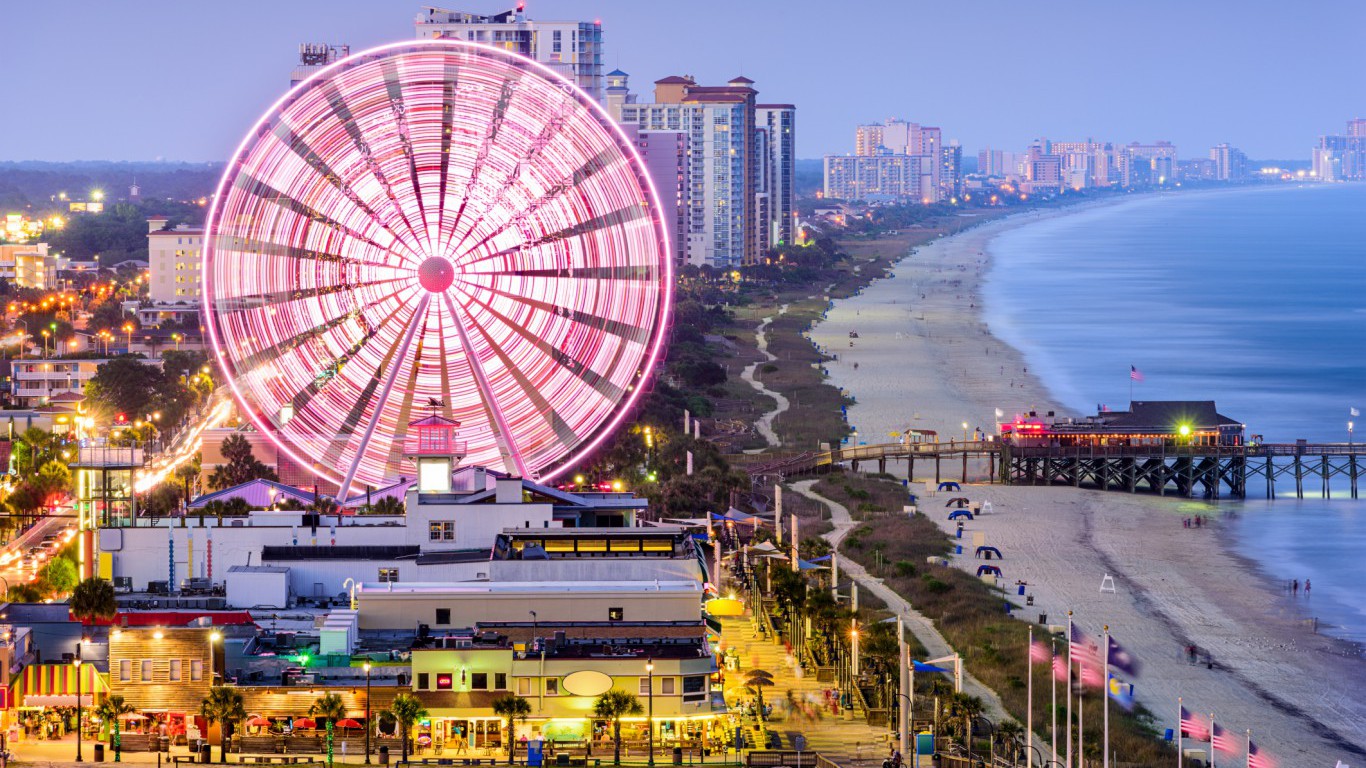
6. Myrtle Beach, South Carolina
> Population: 30,106
> Recorded hurricanes since 1970: 24
> Last hurricane: Matthew, 2016
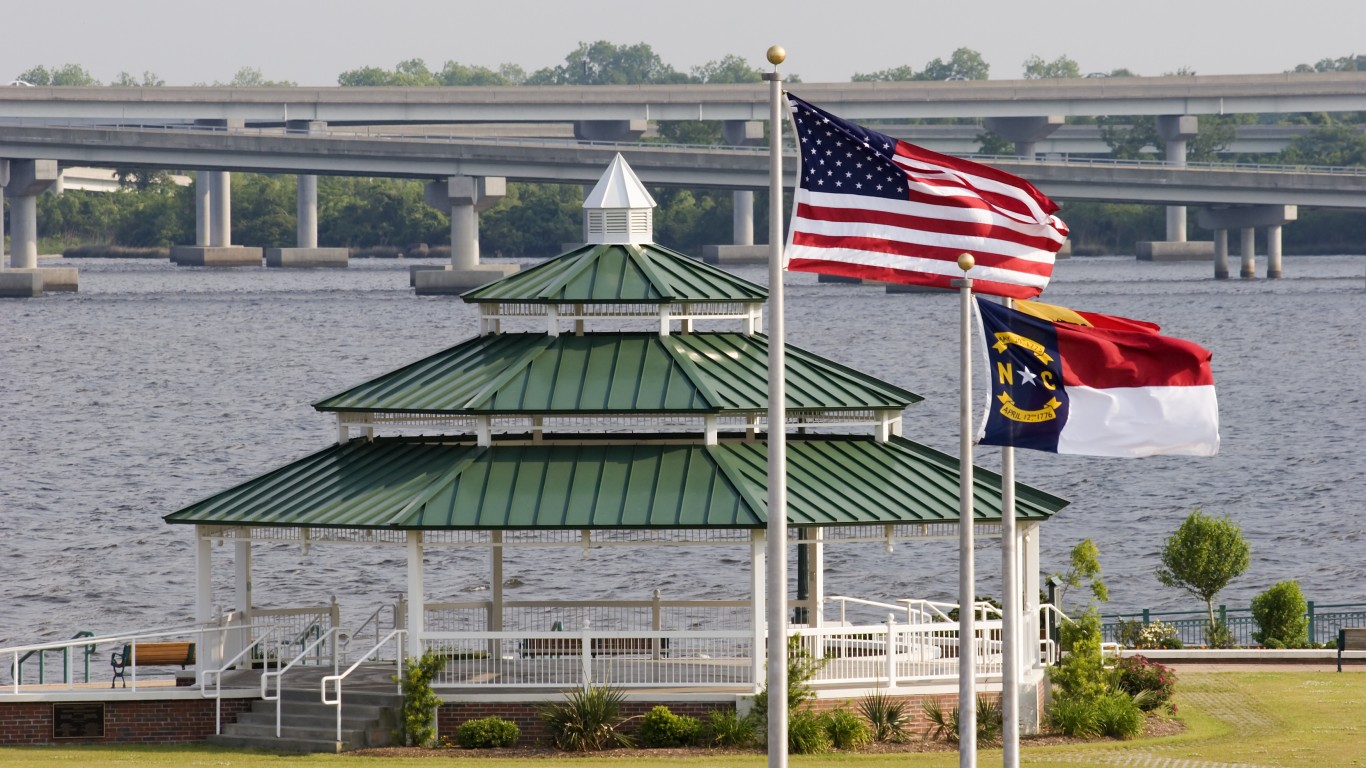
5. New Bern, North Carolina
> Population: 30,075
> Recorded hurricanes since 1970: 24
> Last hurricane: Julia, 2016
[in-text-ad]
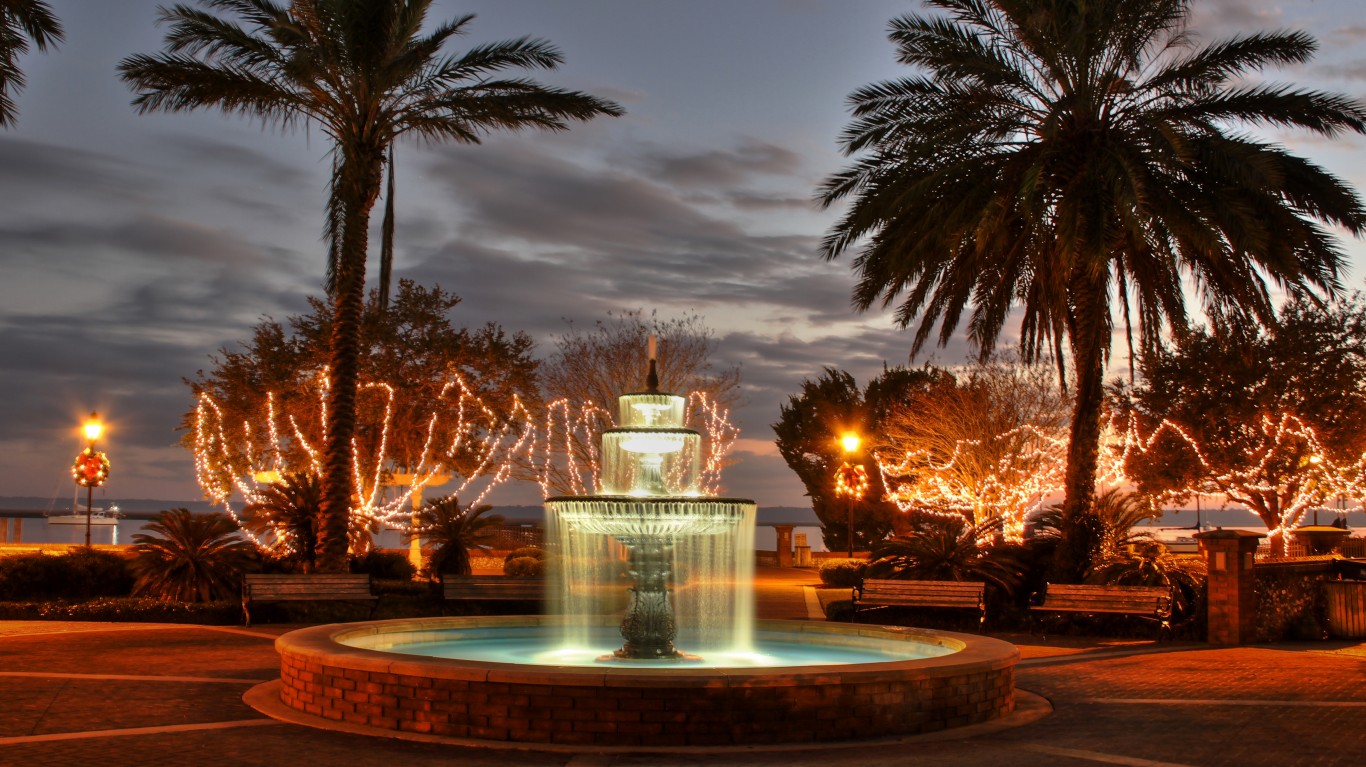
4. St. Marys, Georgia
> Population: 17,853
> Recorded hurricanes since 1970: 24
> Last hurricane: Julia, 2016
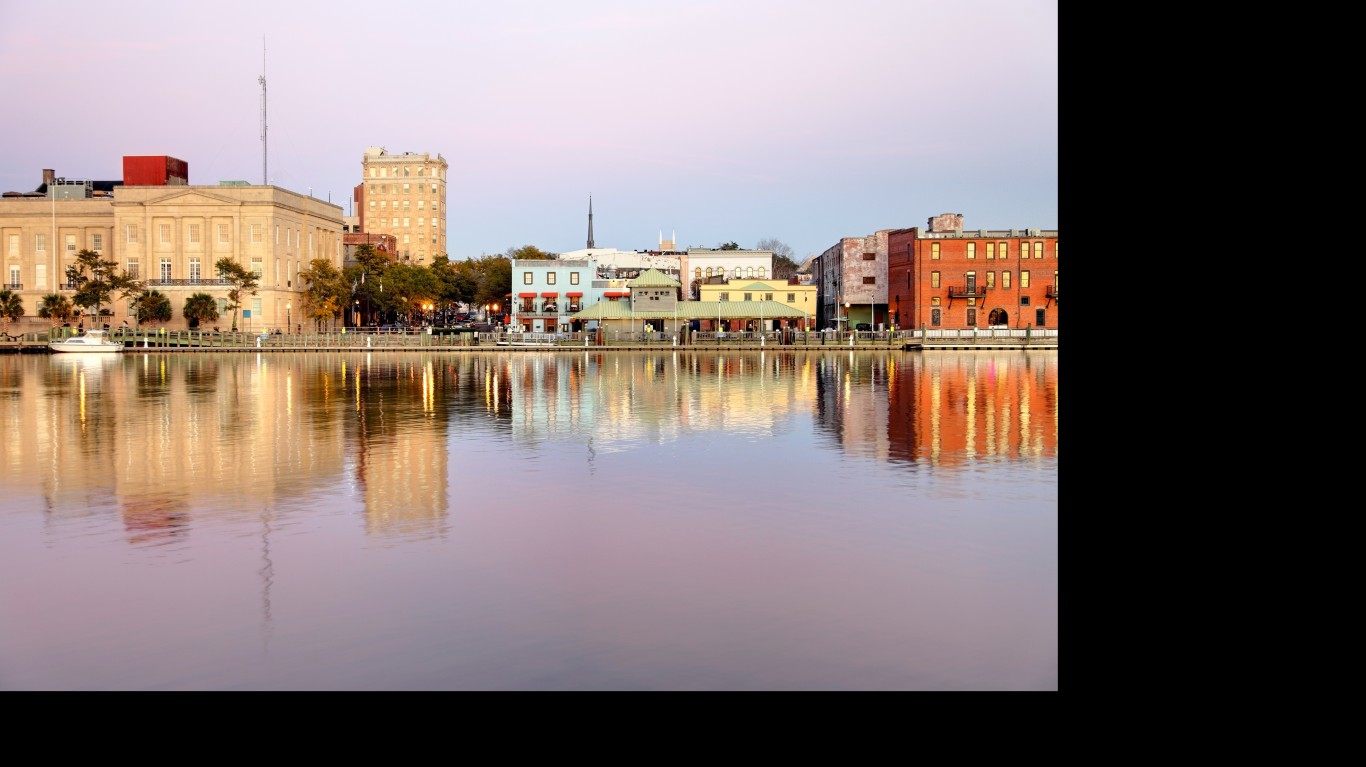
3. Wilmington, North Carolina
> Population: 113,724
> Recorded hurricanes since 1970: 24
> Last hurricane: Matthew, 2016
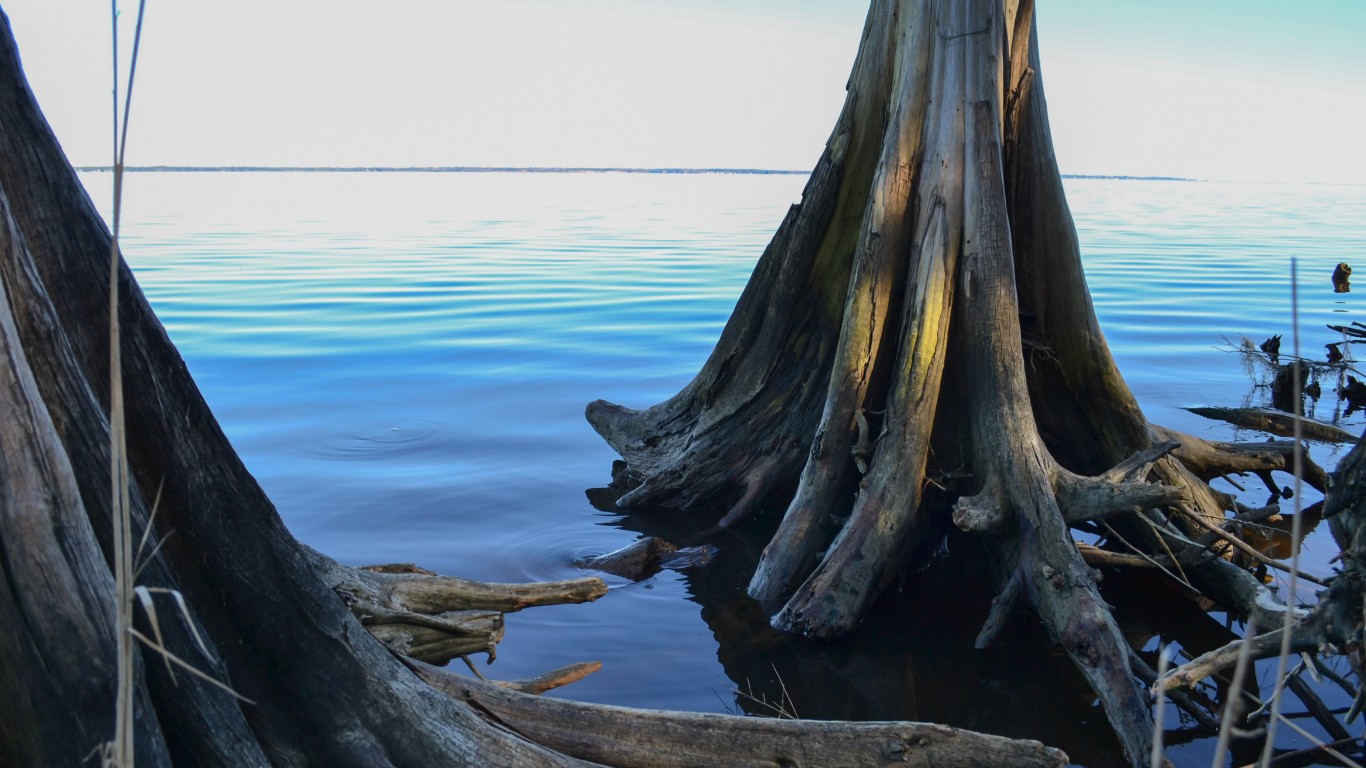
2. Havelock, North Carolina
> Population: 20,630
> Recorded hurricanes since 1970: 25
> Last hurricane: Julia, 2016
[in-text-ad-2]
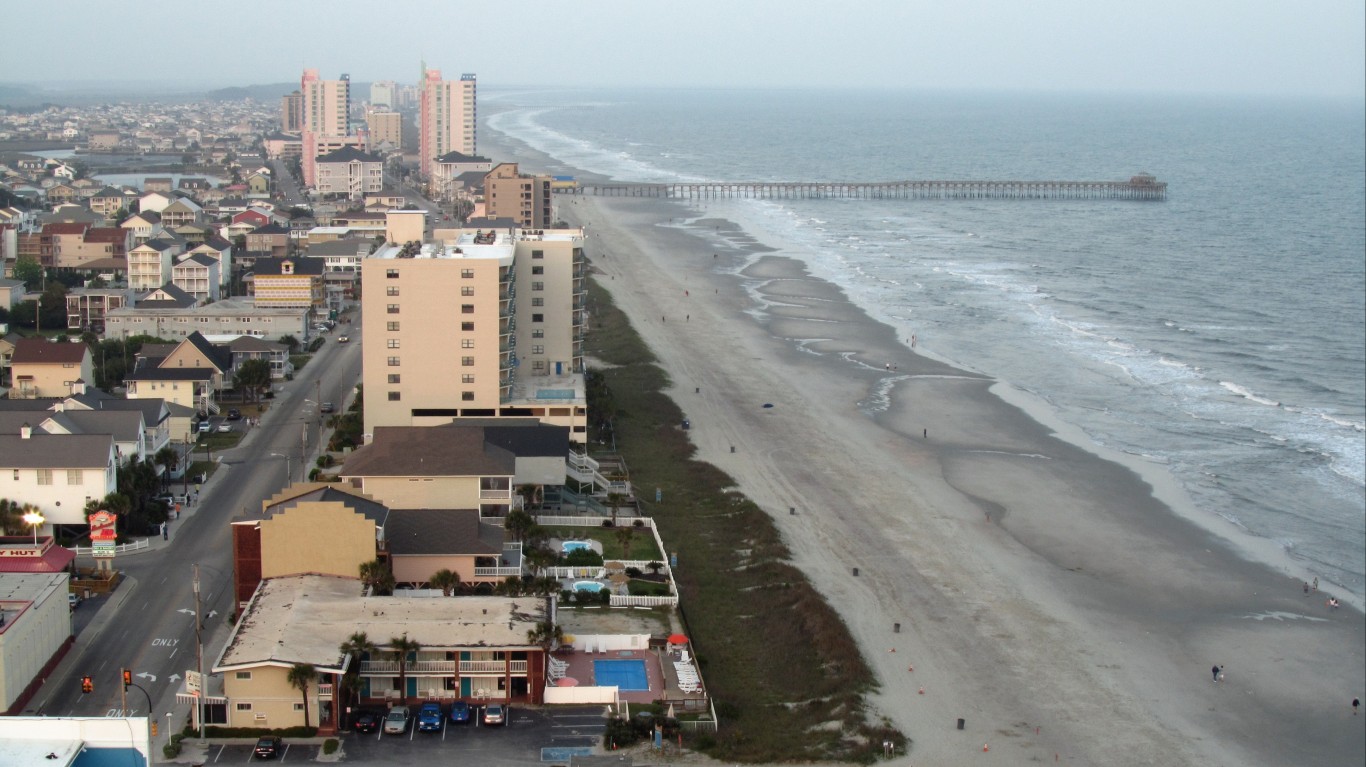
1. North Myrtle Beach, South Carolina
> Population: 15,201
> Recorded hurricanes since 1970: 27
> Last hurricane: Matthew, 2016
After two decades of reviewing financial products I haven’t seen anything like this. Credit card companies are at war, handing out free rewards and benefits to win the best customers.
A good cash back card can be worth thousands of dollars a year in free money, not to mention other perks like travel, insurance, and access to fancy lounges.
Our top pick today pays up to 5% cash back, a $200 bonus on top, and $0 annual fee. Click here to apply before they stop offering rewards this generous.
Flywheel Publishing has partnered with CardRatings for our coverage of credit card products. Flywheel Publishing and CardRatings may receive a commission from card issuers.
Thank you for reading! Have some feedback for us?
Contact the 24/7 Wall St. editorial team.